#also this analysis is potentially controversial
Explore tagged Tumblr posts
Text
Arcane is a Masterclass in visual storytelling
I hate that a lot of the discourse post Arcane has been centered around it's focus on visual storytelling. Whether this be in regards to character interactions, or plot hints, etc, it seems that the genius of Fortiche and the writers is being criticized unnecessarily. This studio accomplishes what every artist DREAMS of excelling at. It's one of the things I appreciate most about the show. It uses its medium, animation, to its absolute fullest potential. It requires analysis and multiple rewatches and study to fully appreciate it. And I wanted to break down a specific moment that really does illustrate the control Fortiche has over every SECOND of this show (and one that's been controversial) Spoilers for Arcane S2 Episode 9
There is a set up in this final scene that lets us know what will happen to Jinx before it happens. And it lasts a single frame. Your eye and subconscious will register it before your brain ever does. As Jinx throws herself at Warwick/Vander and Vi pushes herself up to reach for her, a single frame focuses on the Hextech crystal in Vi's gauntlet.

Visually the scene could have cut from Vi's face, to her reaching for Jinx. But it shows us the Hextech purposefully - because it will be relevant to the scene. This is a visual cue for "remember this is here, remember what it does? It's about to have a payoff." And it's FAST, but on PURPOSE. And we see the payoff once Jinx uses it to depower the gauntlet moments later.

We knew as the audience, something would, because there was intentionality reminding us it was there. The way Jinx was going to fall was spelled out before it happened. Simultaneously, what they DON'T show in this scene is equally as relevant.

Jinx pulls out the bomb but we never see her deploy the pin. (She clearly DOES as there is an ensuing explosion). But this is different from the moment in season 1 on the bridge during her fight with Ekko, when we see the pin and bomb roll out of her hand before Ekko's reaction shot and the explosion. In that moment they gave us the visual indication of "there is no time" and indeed, they are both caught in the explosion.

But, in the S2 finale, the visual delay in her not removing the pin for us on screen, gives her canonically more time to escape its blast. It's a subtle visual nod to "Never found the body" trope. Hey never saw her pull the pin sooo ;) winkwinkwinknudgenudge. It's a hint to her survival due to nothing more than a single action of what we DON'T see. It needs to be subtle and tricky so that we DO have trouble believing it, but that we also still have a modicum of hope that we're right... That's awesome storytelling.

The next moment we are given a visual of the explosion we see a clear (incredibly fast) offshoot her shimmer abilities (as many have already pointed out.
Finally, in the final scene, Caitlyn nor Vi say a single word about the fallout of the battle. But we are given three visual cues to piece together what happened. Our minds are still purposefully meant to be processing the 'death' of Jinx, which as viewers, occurred 60 seconds ago.

The final battle occurred at the top of the Hexgate and Cait is looking at a blueprint of its construction.

2. The next cut is to the detonated head of the bomb we saw Jinx use while falling, meaning Cait is specifically thinking of the same moment we are. The single piece of bomb she's looking at also insinuates that's the only thing they "found" of her. Another nod to the "no body, no death" trope. But what is she thinking about it?

3. It shows us exactly what she sees and is thinking. A specific location within the Hexgates (which, notably, also includes the only TEXT we can visually make out. The line above it is pure scrawl.) 'air ducts'. An escape route in the same direction we saw Jinx's shimmer line go.
Jinx is likely alive and not a single line of dialogue was needed for that speculation to make sense or be followable.
Without a relevant line of dialogue (besides Cait's memorial-esque voiceover) since the battle, we can be relatively certain of three things:
1.) Jinx escaped the blast 2.) Jinx fled Piltover/Zaun 3.) Cait/Vi know this or suspect it (I believe Vi knows but that's a whole other meta of mine)
Whether or not that is your storytelling *preference*, this show needs to be appropriately commended for it's mastery of its art form. While I think it's fine and fair to say "I wish we had a bit of dialogue" regarding this or that, or a scene that laid x,y, or z out in a different way - it's not necessary. Not with the way the studio visually has told this entire story.
Anyway I don't even know how to end this, this is just a moment that stood out to me really hard, especially because people had such mixed feelings on the ending.
This studio is so god damn inspiring as someone who's dream is to work in storytelling and animation. Standing ovation.
#arcane#arcane season 2#fortiche#arcane league of legends#animation#jinx#vi#caitlyn kiramman#arcane meta#i think a lot of this style of storytelling was necessary with the time they had to tell it all too#i could bitch about executives and budgets and timelines for animated shows for the rest of my life#but that's never gonna change as long as we live in Capitalism#for what we got this entire show is still EASILY a 9/10 for me
197 notes
·
View notes
Note
Love your Eden’s Garden analyses my dude. Seriously, you’ve tackled aspects of certain characters I hadn’t even considered. I agree about Eloise being one of the blackened, girl is hiding nerves of steel behind a thin layer of shyness. I also think she’s gonna be connected to Desmond as the thing he guards and trusts the most (in reference to what was described in his blackmail). Upon further analysis, Desmond strikes me as someone who wants people to trust him, but has issues trusting others, outside of maybe Eloise. In a nutshell, he wants people to trust him without him putting his trust in other people. That’s his hypocrisy, in my mind at least.
I’m also gonna keep an eye on Grace in the chapter(s) going forward, in addition to Diana and Kai. Her silence after Eva’s execution speaks volumes. Mayhaps she’ll be going through a character arc? I feel like even SHE thought that execution was way too cruel.
On to my questions though! Out of curiosity, with what you’ve said about students’ deaths being linked to their hypocrisies, who do you think is the least hypocritical in the cast? By extension, who do you think is most likely to survive and/or die, at least within the next chapter or two?
Thanks so much lol I'm glad people ave enjoyed my thoughts so far and I've loved hearing everyone else's opinions and theories as well this whole week!
As to answer your question, I've got to say I think the "least" Hypocritical student so far is actually a controversial opinion of mine since I've noticed lots of people don't like his character T_T
It's Kai Monteago. (Note: I have NOT done everyone's FTE's yet but I'm gonna watch each one for this update soon!)
Now, this does not mean I don't think Kai lies or is a hypocrite, just that I think out of everyone on the cast so far he's the one who's the most honest about how he actually feels.
If Wolfgang is the most Hypocritical person because he hides everything he's feeling and doesn't let anyone know what he's actually thinking, then I think Kai is the least hypocritical out of the student body (minus Damon & Diana bc I think they're both being set up obviously as the protag and antag) because he's so honest about everything about himself and doesn't actually feel the need to hide his own insecurities, worries, fears, and anxieties.
Whenever anything goes remotely bad, Kai is always the first out of the cast to admit he didn't actually trust anyone, he's also the only one who's outwardly always wary of others and nervous. He just doesn't like thinking about the potential for someone murdering him or someone winding up dead. But it's pretty clear just from how he acts in his FTE's, trial, and body discovery that he not only doesn't trust anyone there but that he's not afraid to admit that openly when shit hits the fan.
For Kai, it seems like he's fully aware of the situation and thus knows that just agreeing with whatever the rest of the cast is talking about will keep him safe. He obviously is still a bit of a hypocrite because he's judging the ones who openly admit to not trusting other people, but he's also the first of the cast to always admit he had reservations about trusting them to begin with.
In a way, I can't exactly say Kai is a bad person because of his hypocrisy. He's only been an Ultimate for like 1-2 years, which is way less time than most of the student body. All of this is very new to him, he reminds me of Makoto in that sense where he was someone who would've never thought they'd be an Ultimate, or someone who became one by chance. Even the story he shares of how he became The Ultimate Influencer makes me believe that it really was just dumb luck that he got his title.
And he's only really falling in line because he obviously sees the way everyone treats you when you don't agree with the majority opinion, even if that majority opinion is rooted in rationality. In a way, it makes sense that Kai would act this way because he's an Influencer and has to deal with widespread groupthink about himself daily lol Any small action he did in the outside world was scrutinized and judged by an invisible audience, so now when he's in a situation like this he just goes with whatever will make the most people like him.
Though I can definitely see Kai breaking out of that kind of mindset the more he becomes friends with other people, and now that Wolfgang is gone, I definitely think the rest of them will act more freely instead of looking towards a leader of sorts. This is also why I think Kai will be the "support" character for Damon that we thought Eva would be. Kai is the one person left now who's wholly honest about himself, meaning he and Damon can become friends quicker that way and potentially work on investigations.
Also the two of them have very similar talents in the sense that "anyone could do this". But their ideas about their talents are swapped. Someone mentioned earlier that they think Damon might hate being a Debater or that he has some kind of insecurity rooted in the fact that he's a Debater. And I kind of agree. Where as Kai is wholly proud of his title as the Ultimate Influencer, Damon is very insecure about being seen as the Ultimate Debater and makes up for it with a big ego.
He doesn't let anyone look down on him for being an internet personality, and doesn't let lies about his past or things people wouldn't know about anyways (like the scandal he mentions in his FTE) get to him. But Damon flounders when someone even remotely challenges the idea of his talent being "useless" to society. In truth, the both of them are like foils and will probably be paired more often especially since they share a room together.
#This is not to say that Kai doesn't or never worked hard or whatever#but the story for FTE reminds me of the youtubers who made a video one day that just went viral lol#p:eg#kai monteago#project eden's garden#damon maitsu#manifesting Kai Support but its just my kaimon rotted brain speaking#p:eg chapter 1#kai also has experience with people blatantly lying about him and or making things up about him#so I think that makes him inherently distrusting of others right out the gate#but also a secretive person by nature like he obviously hides things about himself bc of his experience as an influencer#and not because he has some dark shadowy past lol#p:eg spoilers#wolfgang akire
44 notes
·
View notes
Text
Permashifting and Respawning: An Analysis of These Advanced Shifting Concepts

Permashifting and Respawning: An Analysis of These Advanced Shifting Concepts
Introduction
Masterlist :
In the realm of shifting consciousness and altering perceived realities, two concepts have emerged as significant subjects of interest and debate: permashifting and respawning. These advanced shifting techniques, while rooted in imaginative and theoretical frameworks, have captured the attention of various communities seeking to explore the boundaries of consciousness and personal reality.
Permashifting refers to the idea of shifting one’s awareness into an alternate reality or state of being for extended periods or permanently while still retaining awareness of the original reality. Respawning involves a process of transitioning to a previous state or reality after experiencing a form of shift or transition, often tied to deeper spiritual or reincarnation practices. Both concepts have sparked intrigue and controversy, challenging traditional notions of reality and consciousness.
This essay aims to provide a comprehensive analysis of permashifting and respawning, delving into their definitions, mechanics, applications, and implications. By exploring the ethical, philosophical, and practical dimensions of these concepts, we seek to understand their potential impact on individuals and society. Furthermore, we will examine the perception of permashifting and respawning within various communities, addressing common misconceptions and controversies that surround them. Through this exploration, we aim to illuminate the complexities and nuances of these advanced shifting concepts and contribute to a more informed and open dialogue on their possibilities and limitations.
TagList of people who either could be interested or that i found info from their page and im crediting them :
@ixzotica, @ieatmoonrocks , @shiftinghoe , @shiftersroom , @lizzy4president
Disclaimers : Read the post fully if you have any question dont hesistate to ask and this is also from my persceptive it might not align with yours and it is okay.
I. Permashifting
A. Definition and Fundamentals
Introduction to Permashifting
Permashifting is a concept that originates from the broader discourse on consciousness and the exploration of alternate realities. The term "permashifting" refers to the theoretical ability to shift one’s awareness to a different reality or dimension permanently or for long periods while maintaining awareness of one's original reality. This concept is often discussed in the context of reality-shifting communities, where individuals explore the potential to alter their conscious experiences beyond the confines of their current reality. The idea is rooted in the belief that multiple realities or dimensions exist simultaneously and that it is possible for a person to relocate their awareness from one reality to another for an extended period.
Mechanics of Permashifting
The mechanics of permashifting involve several key elements that proponents believe facilitate the transition of awareness. At its core, permashifting requires a deep, meditative focus and a strong intent to shift from the current reality to the desired one. Techniques often include visualization practices, scripting of desired outcomes, and the use of affirmations to reinforce the intention to shift. Unlike temporary shifting, which might be likened to a lucid dream or a temporary altered state, permashifting aims for a long-term relocation of awareness. This requires not only mental preparation but also a belief system that supports the existence and accessibility of alternate realities. Importantly, individuals maintain awareness of their original reality and can choose to shift back, highlighting the flexible nature of this concept.
B. Applications and Implications
Practical Applications
While permashifting is primarily discussed in theoretical terms, its potential applications, if proven , could be transformative across various fields. For individuals, the ability to permashift could offer opportunities for personal growth and fulfillment by allowing them to inhabit realities that align more closely with their desires and aspirations. In the realm of therapy and mental health, permashifting could provide alternative avenues for individuals seeking escape from trauma or emotional distress by relocating to a more supportive and nurturing environment. Furthermore, the exploration of permashifting concepts challenges our understanding of reality and consciousness.
Ethical and Philosophical Implications
The concept of permashifting raises several ethical and philosophical questions. Ethically, the idea of permanently or long-term shifting to another reality poses dilemmas regarding responsibility, identity, and the consequences of such a shift on relationships and societal structures. Philosophically, permashifting challenges the fundamental nature of reality, identity, and consciousness. It questions whether identity is inherently tied to a specific reality or if it can transcend physical dimensions. Additionally, the pursuit of permashifting invites debates about the nature of reality itself—whether multiple realities truly exist and if awareness can traverse these realms independently. These questions highlight the complexities and potential consequences of exploring advanced shifting concepts like permashifting.
By examining these aspects, we gain a deeper understanding of the motivations and implications behind the desire to explore and potentially achieve permashifting, setting the stage for further exploration into related concepts like respawning.
II. Respawning
A. Definition and Fundamentals
Introduction to Respawning
Respawning, as detailed in the context of shifting and reincarnation, involves the transference of consciousness and awareness, sometimes referred to as the soul, to another reality or existence. Unlike traditional shifting, which primarily involves the movement of awareness, respawning incorporates a spiritual dimension, aligning closely with reincarnation and the idea of quantum immortality. Respawning is often seen as a deeply personal and spiritual practice that allows individuals to start anew in a different reality, often (according to some beleifs) after fulfilling certain spiritual or karmic obligations in their current existence.
Mechanics of Respawning
The mechanics of respawning are both spiritual and conscious. It involves a process of preparing the mind and spirit for the transition, often through practices like meditation, affirmations, and scripting. Respawners typically maintain that this process is not about physical death but rather about moving one's consciousness to a new reality while potentially leaving behind a "clone" or stand-in in their original reality. This concept is closely tied to spiritual beliefs and practices, emphasizing the continuity of consciousness beyond the physical realm. Respawning is often seen as a way to fulfill one's life purpose and begin a new journey in a reality that better aligns with one's desires and spiritual goals.
B. Applications and Implications
Practical Applications
Respawning offers a unique set of applications, particularly in the realm of personal growth and spiritual exploration. Many practitioners use respawning as a means to escape challenging circumstances in their current reality or to embark on a new life path that aligns more closely with their soul's desires. This can include changing one's identity, circumstances, or even physical appearance. Respawning is often used to heal from past traumas or to fulfill unmet desires in a more conducive environment. The practice has also been linked to creative exploration, as it encourages individuals to imagine and manifest realities that transcend conventional limitations.
Ethical and Philosophical Implications
The concept of respawning raises several ethical and philosophical questions, particularly regarding the nature of life, death, and identity. Ethically, the practice of respawning challenges traditional notions of responsibility and continuity, as individuals navigate the complexities of leaving one reality for another. There are also questions about the implications of leaving behind a "clone" or stand-in and how this affects relationships and commitments in the original reality.
Philosophically, respawning invites discussions about the nature of consciousness and the soul. It challenges the notion of a singular, linear life path and suggests that consciousness can exist and evolve across multiple realities. The practice also touches on ideas of quantum immortality and the multiverse, where all possible realities exist simultaneously and can be accessed through the right spiritual and mental preparations. Respawning emphasizes the subjective nature of death, suggesting that it is not necessarily the end of physical life but rather a transformation or transition to a different state of being.
By exploring these applications and implications, respawning provides a fascinating framework for understanding the possibilities of consciousness and the potential for personal and spiritual transformation. This sets the stage for a broader discussion on community perceptions and misconceptions surrounding these advanced shifting concepts.
III. Community Perception and Misconceptions
A. Perceptions and Misunderstandings
General Community Perception
In the shifting community, the concepts of permashifting and respawning are often misunderstood and criticized, particularly by those who do not fully grasp the motivations and experiences of those who practice these forms of reality shifting. Many critics argue against using shifting as a form of escapism, suggesting that it is an unhealthy way to cope with the challenges of this reality. However, this perspective overlooks the very real struggles that many individuals face in their current lives, such as trauma, mental health issues, and a lack of control over their circumstances. For many, the ability to shift offers a vital means of finding solace, healing, and empowerment.
The criticism that shifting is simply escapism fails to acknowledge the legitimate desire to seek happiness and safety in a reality that aligns more closely with one’s needs and aspirations. Many individuals who turn to shifting have already contemplated far more drastic means of escaping their current circumstances. For these individuals, shifting provides a hopeful and life-affirming alternative to leaving this world through more permanent and peaceful means.
Common Misconceptions
A common misconception is that shifting is inherently dangerous or that it hinders a person's spiritual or personal growth journey. Critics claim that relying on shifting to escape reality prevents individuals from appreciating their current lives and learning necessary life lessons. However, this argument is both hypocritical and dismissive of the very real pain and dissatisfaction that can drive individuals to seek alternative realities.
This reality is often perceived as a blueprint or ultimate standard of existence, yet this view fails to recognize that each person’s experience of reality is subjective and shaped by personal circumstances. For those who have been harmed or marginalized by this world, shifting offers a way to reclaim agency and build a life where they feel respected and valued.
The hypocrisy in the community becomes evident when people judge others for wanting to leave this reality, despite not understanding the depth of their experiences or motivations. Those who deny the possibility of shifting or respawning often do so without considering that other forms of consciousness exploration, such as meditation or lucid dreaming, are widely accepted and even encouraged. This selective acceptance reveals a narrow-minded approach to understanding the broader spectrum of human consciousness and potential.
B. Controversies and Hypocrisy
Hypocrisy in Belief and Practice
The hypocrisy surrounding the criticism of shifting practices is glaring. Many individuals who argue against shifting as escapism fail to acknowledge their own reliance on various forms of escapism, whether it be through entertainment, travel, or other means. Shifting is simply another avenue through which individuals seek fulfillment and peace, yet it is often unfairly singled out and judged more harshly.
Moreover, there is a persistent belief among critics that permashifting and respawning are impossible and that we are somehow "meant" to remain in this reality. This notion is deeply flawed and inherently contradictory. By suggesting that shifting is merely temporary, these critics implicitly deny the legitimacy of shifting altogether, engaging in logical inconsistencies that undermine their own arguments. If shifting is not real or meaningful, then why should its permanence or impermanence matter? This line of thinking reveals a lack of coherent reasoning and reflects an unwillingness to engage with the possibilities that shifting presents.
Additionally, the demand that individuals should "appreciate" or "love" this reality, regardless of their personal suffering, is not only hypocritical but also incredibly insensitive. For those who have endured significant trauma, discrimination, or profound dissatisfaction with their lives, being told to accept this reality feels like a dismissal of their pain. This attitude reeks of privilege and a lack of empathy, as it fails to acknowledge the very real and valid reasons why someone might seek to leave this reality permanently. Telling someone that they must stay and find contentment here ignores the diversity of human experiences and assumes that everyone’s reality is equally tolerable, which is far from the truth.
Addressing Controversies
The controversies surrounding the supposed dangers of shifting are largely based on misunderstandings and misinterpretations. Critics often argue that shifting leads to a detachment from reality or exacerbates mental health issues, but there is little evidence to support these claims. On the contrary, many find that shifting provides a sense of purpose, control, and empowerment that they lacked in their original reality.
Additionally, the idea that this reality is the ultimate blueprint is an oversimplification. Each person’s reality is unique and shaped by their experiences, challenges, and aspirations. Viewing this reality as the definitive version is limiting and fails to recognize the vast potential for exploration and growth in alternate realities.
Ultimately, the decision to engage in permashifting or respawning is a deeply personal one that should be respected. It is essential to foster an open and understanding dialogue that acknowledges the diverse experiences and motivations within the shifting community. By challenging misconceptions and embracing the possibilities of consciousness exploration, we can create a more inclusive and supportive environment for all individuals seeking to navigate their own journeys.
Conclusion
Permashifting and respawning represent advanced shifting concepts that challenge traditional notions of reality and consciousness. While these practices are often misunderstood and criticized, they offer significant potential for personal and spiritual transformation. For many individuals, shifting provides a vital means of finding solace, healing, and empowerment in the face of challenging circumstances. By examining the mechanics, applications, and implications of these concepts, we gain a deeper understanding of their potential impact on individuals and society.
Furthermore, addressing the community perceptions and misconceptions surrounding permashifting and respawning allows for a more informed and open dialogue. By fostering a greater understanding and acceptance of these advanced shifting concepts, we can create a more inclusive and supportive environment for those seeking to explore the boundaries of consciousness and personal reality. Through this exploration, we aim to illuminate the complexities and nuances of these advanced shifting concepts and contribute to a more informed and open dialogue on their possibilities and limitations.
#reality shifting#shiftblr#desired reality#shifting#shifting community#shifting realities#shifters#reality shift#reality shifter#shifting antis dni
62 notes
·
View notes
Text
Ichigo and Orihime's Relationship Analysis
Ichihime is both an extremely popular pairing in the Bleach fandom but also a very controversial one, as the rival ship, IchiRuki, is just as popular. As a result, the community was divided over the decision to pair them together and for Rukia to be paired with Renji. Nonetheless, it appeared that creator Tite Kubo had planned for these romantic outcomes from the start.
Ichigo and Orihime's relationship makes sense because they share a deep bond that developed over time. Orihime's unwavering support and understanding complement Ichigo's personality, creating a connection based on mutual trust.
Their Relationship

Orihime had first met Ichigo under tragic circumstances, as she took her severely injured brother to a clinic that Ichigo’s father owned and watched him die there. By the time they started high school, Orihime had already developed an interest in Ichigo and was even teased for this by her best friend, Tatsuki, who was also friends with him. She would sometimes fantasize about him in comedic ways. Their relationship is often very sincere and wholesome. Ichigo is normally quick to annoy and can be seen arguing with others, but when it comes to Orihime, he is much kinder and gentler.
He is even indulging of her silly nature and will act comical with her from time to time. Ichigo showed no apparent feelings for her, but became flustered and stated she was perhaps showing a bit too much when she wore revealing clothing in front of him, unaware that she only did so to attract his attention.
Orihime's Confession

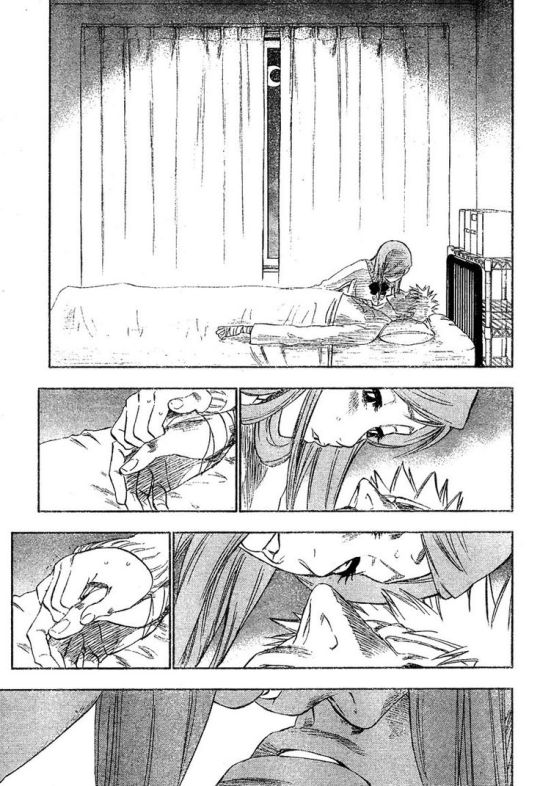
Orihime is very kind to Ichigo but can be submissive to her own feelings for him. She feels very jealous due to Ichigo’s close friendship with Rukia, and admitted this to Rangiku who comforted her about her feelings.
Orihime's confession to a sleeping Ichigo in Bleach is an important moment in the series. This happens during the Hueco Mundo arc when Orihime, feeling a sense of despair and the weight of her past trauma, decides to express her feelings for Ichigo.
Orihime's character carries the emotional burden of losing her older brother, Sora, and her past experiences with bullying. This trauma had an impact on her personality and emotional well-being. Her confession to Ichigo reflects her vulnerability and the deep emotional struggles she faces. Choosing to confess while Ichigo is asleep shows Orihime's internal conflicts and hesitancy to face the potential consequences of her feelings.
Orihime struggles with feelings of insecurity and low self-esteem, likely stemming from her past experiences with bullying. This could have hindered her confidence to openly express her romantic feelings to Ichigo. Orihime is highly perceptive of Ichigo's emotions and priorities. She might have been aware of his complex and challenging battles, understanding that expressing her romantic feelings could create additional emotional burden for him.
Ichigo's Love for Orihime

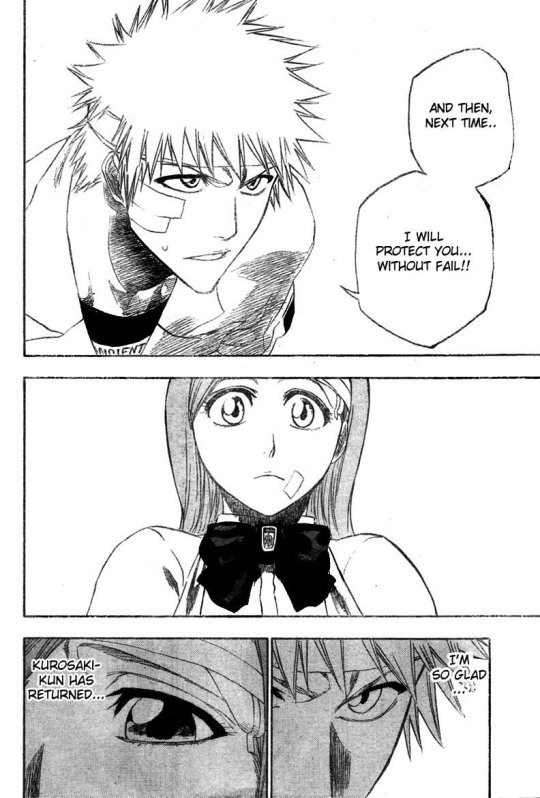
Ichigo's feelings in Bleach are often portrayed through subtle actions and expressions rather than explicit blushing. Some subtle hints to Ichigo's feelings for certain characters, like Orihime, include:
Protective Instincts: Ichigo consistently shows a strong desire to protect those he cares about, especially Orihime. This protective nature can be interpreted as a sign of deeper feelings.
Emotional Concern: Ichigo demonstrates genuine concern for Orihime's well-being. His emotional responses to her struggles and moments of vulnerability suggest a connection that goes beyond friendship.
Prioritizing Her Safety: In critical situations, Ichigo often prioritizes Orihime's safety, indicating a special place she holds in his life.
Facial Expressions: While Ichigo may not blush overtly, subtle changes in his facial expressions during certain interactions, particularly with Orihime, can hint at underlying emotions.
Shared Silences: Sometimes, the absence of words between Ichigo and Orihime speaks volumes. Their shared silences and meaningful glances contribute to the subtlety of their relationship.
These subtle hints collectively build a narrative of Ichigo's feelings without relying on traditional blushing cues, making his emotions more nuanced in the context of their relationship.
Hueco Mundo Arc


Throughout the story, particularly during the Hueco Mundo arc and beyond, there are numerous instances that imply Ichigo's growing affection for Orihime. His actions, protective instincts, and emotional responses towards her suggest a deeper connection that evolves beyond friendship.
Orihime's fear of Ichigo's Hollow side during the Hueco Mundo arc is a poignant moment in Bleach, but there are valid reasons to defend the portrayal of this her shock. Orihime's fear is a realistic emotional response to witnessing Ichigo's transformation into his Hollow form. The Hollow side represents a powerful and menacing force, and Orihime's fear is a natural reaction to the sudden change in Ichigo.
Ichigo's Hollow mask symbolizes the darker, more primal aspects of his nature. Orihime's initial fear and later acceptance of this mask symbolize her understanding and acceptance of all facets of Ichigo, even the ones he considers monstrous.
Resonance and Connection
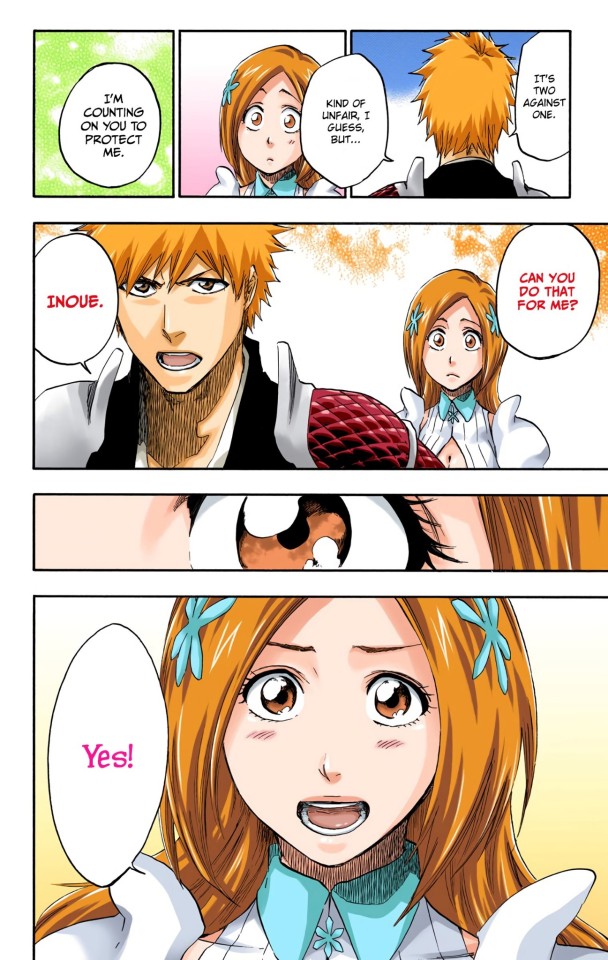
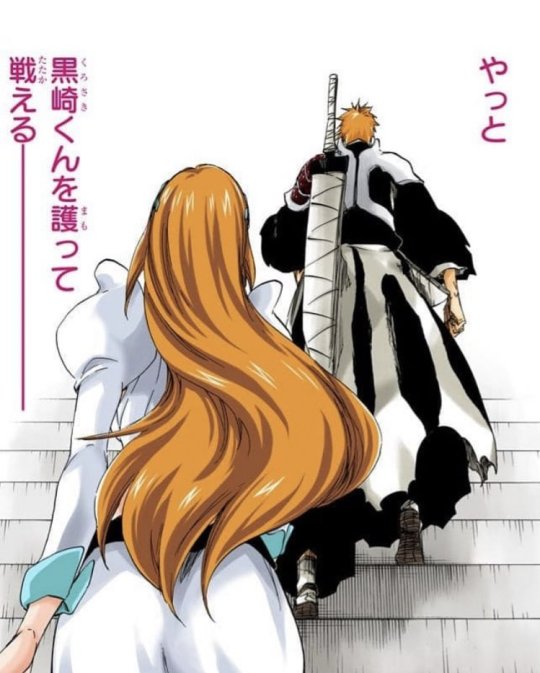
The concept of resonance is a recurring theme in Bleach, particularly in relation to Ichigo and Orihime's connection. Their souls resonate with each other, symbolizing their deep emotional bond and shared experiences. This resonance serves as a driving force in their relationship, allowing them to understand and support each other on a profound level.
Resonance also implies an understanding that goes beyond verbal communication. Ichigo and Orihime often comprehend each other's feelings and thoughts without the need for explicit expression, showcasing an intuitive connection.
In the Thousand-Year Blood War arc of Bleach, the relationship between Ichigo and Orihime undergoes significant developments amidst the intense battles and heightened stakes. As the Quincies threaten the Soul Society, Ichigo's protective instincts come to the forefront, and Orihime stands by his side, unwavering in her support. Orihime's steadfast commitment to Ichigo is evident as she provides support during the challenging battles. Ichigo, in turn, draws strength from Orihime's presence, showcasing the depth of their connection.
Happily Ever After

In the final chapter of Bleach, the envisioned future for Ichigo and Orihime comes to fruition, depicting a significant shift in their lives. Orihime, no longer alone, finds comfort and companionship with Ichigo by her side. Ichigo, once characterized by a degree of cynicism, has undergone a positive transformation, reflecting personal growth and a more open-hearted demeanor.
This concluding chapter provides a glimpse into the peaceful and fulfilling life that Ichigo and Orihime have built together. The challenges and conflicts from earlier arcs have given way to the quiet joys of family life. The presence of their son Kazui not only signifies the continuation of their lineage but also shows the love that define the Kurosaki family. Ultimately, the final chapter serves as a heartwarming conclusion to Ichigo and Orihime's journey, showcasing their growth as individuals and as a couple.
#relationship#manga analysis#analysis#shipping#ichigo x orihime#ichigo kurosaki#bleach orihime#orihime inoue#ichihime#bleach#bleach ships#bleach ichigo#romance#love story#anime thoughts#anime and manga
114 notes
·
View notes
Text
You Simple Vile Monstrosity: Rook and the Flowers of Evil

My other two dumb history posts have at least a semblance of fun fact to them, but this is mostly going to be literary analysis and some theory. There's some interesting stuff here sure, but I don't really think it adds much to the overall landscape of twst theories. But it does make Rook make more sense to me so I am making this post anyway.
So without further ado, if you are like me and enjoy reading twst theories, you might know that the beginning lines of Twisted Wonderland are something we have been debating the meaning of since the game came out really. While I think we have been closing in on their true meaning as Chapter 7 progresses along, the phrase "Flowers of Evil" can actually refer to something specific: a french poetry collection of the same name (Les Fleurs du mal in french) by a poet name Charles Baudelaire originally published in 1857. The collection was extremely controversial, but today it is highly lauded and has inspired several other literary works, including a manga series by Shūzō Oshimi of the same name. I found out about the poetry collection while working on this request and finally finished reading it... and another essay by Baudelaire for reasons we can talk about later on in the post. For now let's talk poetry.
Beauté! 100 Points!

I don't speak french, so I read an English translation done by Aaron Poochigian that does contain the original french text in the back half of the book. The Flowers of Evil is split into seven-ish parts: The Flowers of Evil (just containing "To the Reader"), Spleen and the Ideal, Parisian Scenes, Wine, Flowers of Evil (again but with 12 poems this time), Revolt, and then Death. The sections are more or less organized by the subject of the poems, Spleen and the Ideal is the largest with Baudelaire musing over what the ideal concept of beauty is while Wine deals with getting drunk (on wine mostly if you can believe it.) One of the things that jumps out very quickly about Baudelaire's work is that his concept of beauty is almost synonymous with his concept of evil. He writes a lot about maggots eating corpses, about decay, he has a few poems that talk about vampires appearing to be the highest form of beauty but really being husks of rotted flesh; it's all very much about this acceptance that evil is a part of life and human nature, so therefore there must be beauty in it. The concept of "ideal beauty" must by it's nature be divorced from the concept of "morality." When Rook talks about the potential for Leona or Malleus to kill him and how beautiful that would be, I think he means the act of destruction itself would be beautiful. The circumstances surrounding it and the consequences of it are irrelevant to the concept; this is also why while he initially says he cannot find the crimson lotuses in GloMas beautiful Deuce accuses him of doing just that after everything is said and done. He cannot find beauty in Rollo's actions, but the visual and the fight are beautiful because of the effort he and the other students put in to stop them. And perhaps most importantly, it's why he is willing to drink Vil's poison and look upon what is supposedly ultimate ugliness and say "In this moment you are the fairest of them all." Because how could an act born out of such raw and genuine emotion be anything but?
Le Chasseur D'Armour, The Hunter of Love

Baudelaire wasn't just a poet, he fancied himself a critic and wrote multiple essays, the one I read for this post is The Painter of Modern Life. Which is actually a collection of several but they are all related, and I was directed to them by this wordpress post. In it, Baudelaire muses over how things can be both beautiful and ugly, and why:
"Beauty is made up of an eternal, invariable element, whose quantity it is excessively difficult to determine, and of a relative, circumstantial element... which severally or all at once, the age, its fashions, its morals, its emotions."
He was talking about fashion plates that depicted outdated costumes, but his point was more or less that if you strictly look at the design of the costume they look ridiculous: ugly. But when you take into account their historical value (these particular plates were all from the around the time of the French revolution) they become exceedingly important: beautiful. He also mentions in this same essay the importance of not just taking into account the opinions of so called "masters" and sneers at people who think they understand what is beautiful just because they have seen a painting done by a professional:
"... to declare that Raphael, or Racine, does not contain the whole secret, and that minor poets too have something good, solid and delightful to offer... that we might love general beauty, as it is expressed by classical poets and artists, we are no less wrong to neglect particular beauty, the beauty of circumstance and the sketch of manners."
In chapter 5, while helping Vil judge the auditions for VDC, Rook gives every audition 100 points because, well, in his mind they are all an example of perfect beauty specifically because they are the work of amateurs, and that is no less valuable to him or less worthy of praise that the work of the master. Now granted he clearly does value professional quality (he did have reasons for voting for Neige other than being a massive simp. Valid ones even if loosing does sting) but that's only in the context of strict rules and guidelines. When Rook is asked for his opinion, while he certainly does believe there is an absolute, academic definition beauty, he doesn't place any value on where that beauty comes from. Baudelaire muses over how human life "accidentally" puts mysterious beauty into the world, and the true appreciator of beauty must make himself not strictly a poet but:
"...an observer of life, and only later set himself the task of acquiring the means of expressing it... For most of us... the fantastic reality of life has become singularly diluted. [But he] never ceases to drink it in; his eyes and memories are full of it."
I strongly dislike suggesting in these posts that xyz is "the definitive reason" for why a character acts the way that he does, but I do think it is very interesting how well this describes Rook's ethos. He thinks of himself as a hunter, but in order to do that he needs to observe. Sure he takes it to exceptionally extreme lengths, but it makes him one of the most lively members of the NRC cast. Baudelaire is right, there are a million things about life we miss on a day to day basis wherein true beauty lies, but Rook sees all of it. His eyes, memories, camera, and secret photo albums are fit to burst with it.
My Noble and Beautiful Flower of Evil

I mentioned the opening text at the beginning of this post, and I stand by my interpretation that the phrase "flower of evil" it uses likely is not a specific reference to any of the poems themselves... beyond the obvious note that it is a collection of poems about finding beauty in, well, evil and most of the characters are based off of villains.
But there was something that started gnawing at me when I read the introduction to my translation, which was written by a poet named Dana Gioia. It was a very well written summary of Baudelaire's life and the significance of his work, but it mentioned a connection that I have seen brought up in twst theorizing before: Edgar Allen Poe.
You see, Baudelaire was obsessed with Poe. To the point that (according to the introduction) "He considered Poe a sacred martyr for art and referred to him as 'Saint Edgar.' In his morning devotions, Baudelaire prayed first to God and then to Poe."
I have nothing to say on that (because really what could you) but the point that Gioia wanted to make in that introduction was that Poe had a massive influence on Baudelaire's writing style. He wrote multiple essays on his work and translated them into French because he felt like Poe deserved the recognition, so while Gioia used this to argue that Poe's influence on Baudelaire shouldn't be underestimated...
I can't find the post, but someone was talking about how Malleus's mother's name Meleanor is very similar to "Lenore" and I recall people sort of brushing that connection off. I don't that name is a coincidence. I think the poem "Lenore" might very well have been something thought about when constructing her character, and that the themes in Poe's work might be very relevant to the overall story of Twisted Wonderland.
Something about ravens and telltale hearts just feels like they fit; maybe we have got it all wrong and Yuu's visions aren't coming from the mirror in Ramshackle, but the floorboards.
Semi- Unrelated Fun Facts:
If you read the name Baudelaire and thought to yourself it sounded familiar, you might have be thinking of the Baudelaire children from A Series of Unfortunate Events. This isn't exactly a coincidence as the author of the series admits to his writing being heavily influenced by Charles Baudelaire to the point he actually wrote the afterword to the translation I own.
Dana Gioia is the former Poet Laureate of the state of California, something that deeply confused me. Apparently the Governor of California appoints someone to a 2 year term and they travel around the state to promote poetry and literacy which is apparently something that 46/50 U.S. states and D.C. does to????
My glorious motherland of Pennsylvania is not one of these states, apparently we only ever appointed one, then eliminated the position entirely after he retired, and then started just. Handing out ones to people in individual cities and counties. Which is so par for the course here I don't know why I am surprised.
One of the first things any college level literature course will try to drill into you is that you don't examine the life of an author when examining their work. It might sound silly, but I think Baudelaire is a great example of why that's important. The man was addicted to drugs and sex, refused to get a "real job", lived off his inheritance from his wealthy father and eventually whatever money he could convince his mother to send him his entire adult life, and had her use her political connections to bail him out of legal trouble multiple times.
If I thought too hard about that it would make his lines in "Skeleton Laborers" (Nothingness is treacherous.//Even Death is a deceiver.//Alas, forever and ever,//work may be awaiting us) fall terribly flat, which I think does them a disservice. The man was very talented and I am glad he wrote them because I felt very seen when I read them.
Baudelaire opened his publication with a note to the reader, but he made it a full poem entitled "To the Reader." I liked the ending stanza so much I used a version of it to title my blog, and eventually my current masterlist: (Boredom! Moist-eyed, he dreams, while pulling on//a hookah pipe, of guillotine-cleft necks.//You, reader, know this tender freak of freaks-//hypocrite reader-mirror-man-mytwin!)
Likewise the title of this post is also taken from part of a poem, "Hymn to Beauty" (Beauty, you simple, vile monstrosity,//I cannot care about your origin,//provided that your gaze, smile, feet show me//a sweet infinity I have never known.) I think that fits Rook's ideals rather well, don't you?
76 notes
·
View notes
Note
I've seen a lot of hate for the previews of wottg with people saying that rick has just written this book for money, and the characters aren't accurate.
That he's just gone on a crazy tangent and isn't doing anymore fan service.
Especially hate towards annabeth for wanting to throw a party and to grover.
What's your take?
Love this ask soo much!! Thank you anon because now I have a reason to rant on the thoughts in my head and I promise you I didn't think I would write this much...
Percy's mental condition as shown in the first chapter is pretty well displayed in my opinion. My boy is fed up, requires therapy, a break and blue food but he has to face WEEKEND CLASSES (I have them and I can tell you that they are the absolutely worst way to torture your sanity). I'll give Rick points for this though. The entire episode with Hecate was also written well and IT DID NOT FEEL LIKE FANSERVICE TO ME ATLEAST. Percy feels like himself at least from the preview I can say.
HOWEVER I have my own set of issues too. Now I will tell you that I am a kind of person who refrains from the negatives of any situation before seeing the whole story BUT sometimes I have opinions which I will express now. To start off, I do not like they way Rick just made Grover and his hooves not appear because of the mist concept. This was actually a deal in tlt and have it just discarded away in one line in the book put me off a little. I love continuity in books and small errors are like pricking needles for me.
Now we come to the most controversial moment of them all: CHAPTER 3!!! See I love Annabeth having friends (happier because it fulfills my Annabeth being a social butterfly head canon). I love Hana loathing Percy (she definitely has a crush on Annabeth, fight me). But I have an issue with the way Percy sees himself when he is in the midst of her friends. He makes himself inferior and an idiot when he absolutely isn't and I have an issue with that because it isn't good!
Annabeth proposing to have a party is slightly out of character in MY OPINION but okay I can accept it and see how Rick wants to proceed with this so neutral on that till now. HOWEVER I hope he makes Annabeth and Percy have a fight on this because Percy has to let out his problems and their relationship needs to have some angst from time to time (also in my opinion).
Overall, I am extremely excited and hoping to read the book as soon as it arrives (curse you Amazon). I believe that you can't hate the book on the basis of the preview but there are few... unsettling things which can be set right if handled well later in the book. I do think sometimes Rick does not effectively utilise the potential but I'll read the book nevertheless. It's the very reason I look forward to live through my exams. So yeah I have no strong opinions and would most probably drop in a detailed analysis after I actually read the book.
Thanks again for the ask anon! Loved answering it
#ivy speaks#pjo#pjo fandom#pjo series#pjoverse#ivy answers#percy pjo#ask answered#percabeth#anon ask#anonymous#thanks anon!#asks#answered asks#ask me anything#answered#wrath of the triple goddess#wottg#wottg spoilers#annabeth and percy#annabeth percy jackson#annabeth x percy#grover percy jackson#grover pjo#grover underwood#percy and grover#percy jackson#percy and annabeth#percy jackson books#percy series
20 notes
·
View notes
Text
My complete and unhinged Metatron analysis
Hello, I have seen that many people are theorizing about Metatron, so I'm here presenting an analysis of who Metatron is, rather his biblical role and how he may be more connected to the Aziraphale and Crowley than we might believe.
-Also, English is not my first language, so please be patient with me-
ANALYSIS OF METATRON AS A FIGURE WITHIN CHRISTIANITY:
Metatron, has always been a controversial figure in Christianity, full of dualisms.
Let's start with its etymologically. The term Metatron has two completely different translations: one comes from the Greek metradromos meaning "he who pursues with vengeance"; or it is also possible that its origin is from the term meta ton thronon which means "closer to the throne". There are many doubts about his true origin, since it is mentioned in non-canonical versions of the Bible, during Genesis*. However, in the most current and official versions of the Bible, it never appears.
While there is nothing official, the most accepted version is that he is actually the prophet Enoch, Noah's grandfather. Enoch -who used to have his own book of the Bible in earlier versions- was a prophet who had the God-given gift of visiting Heaven through different visions. In his 1st vision, Enoch has the mission to intercede with God on behalf of the fallen angels. In another vision, he sees the Cherubim in Heaven, whom he describes as beings of fire. Later, he is taken by the archangel Michael to the highest heaven. Enoch also travels in his visions or dreams to the tree of knowledge. He is supposed to have lived 365 years and, at the end of his visions, Enoch is chosen by God to become the archangel Metatron, a powerful archangel who is also called the little Yahweh.
There is another explanation for his origin: he is the first being of creation, seated at the left hand of the father, which in tradition is associated with Satan.
The Zohar also describes Metatron as "the king of angels" who reigns over the tree of the knowledge of good and evil.
When Enoch was on Earth, he devoted himself to writing a book containing the secrets of wisdom until he was taken to Heaven to become an angel. God allowed Enoch to continue this same ministry in Heaven** .

FUN FACTS:
Metatron was the one who led the Israelites to the Promised Land (Moses).
Metatron is the patron angel of children.
Metatron transmits God's daily orders to the angels Gabriel and Raphael.
Not being an angel from his origin, Metatron is associated with the angels in charge of Death, he supervises them when they help the souls to make their transition from the physical to the spiritual plane.
He is canonically the most powerful archangel in the entire celestial realm, second only to God. His role is similar to Lucifer's original rol, the right hand of God.
The archangel Metatron is in charge of directing the ascension and activation of the human being's light body. Having been human, he knows the path of enlightenment. He represents the potential for transformation and purification of the soul when it sets out to transcend matter to unite with the pure spirit of the Divine. Metatron is in charge of guiding the souls towards the light, towards purity (insert the fact that he asks for coffee with almonds, which in Christianity is related to purification).

METATRON IN THE LORE OF GOOD OMENS
It is worth mentioning that in the original Good Omens book, Metatron is the only angel that appears besides Aziraphale. While other angels are mentioned, Metatron is the only one who appears, firstly when Zira wants to talk to God, and secondly when Beelzebub and Metatron make presence at the Tadfield airbase to try to convince Adam to restart the end of the world (it is not Gabriel who appears in the book).
And, considering that the 3rd season is based on the sequel to the book that never came out, it makes sense that Metatron would have had a bigger role because he was always a present character.
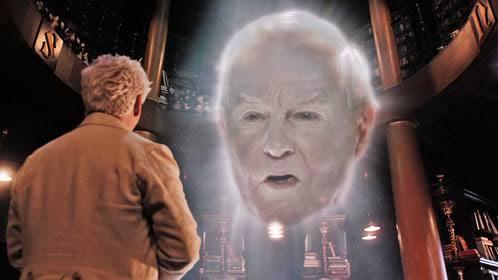
HIS RELATIONSHIP WITH CROWLEY AND ZIRA:
So, from all this information, I would like to point out that Metatron not only used to be human and knows the "true path of purification," but he is also in charge of caring the tree of knowledge.
You know, that tree?

Aziraphale and Crowley represent the two things that oppose his very existence: an angel that is becoming more and more human with each passing day and the Serpent of Temptation that keeps doubting and questioning the edges and the difference between good and evil. These two not only were they not punished, but together they are two extremely powerful entities, perhaps as powerful as he is.
They are a threat… but only together.
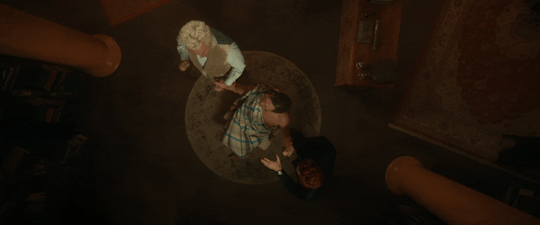
Metatron can see in Aziraphale the very opposite of what he represents, someone who needs to return to the path of divinity:
Aziraphale, the supposed guardian of Eden, who started out as an angel, who gradually transformed into someone with more and more human habits, falling into almost all the deadly sins, in love with the Serpent who tempted humans to eat from the forbidden fruit of the tree of knowledge. Someone who loves forbidden books and bibles, with a hedonistic and condescending personality who managed to deceive his brother angels for millennia to protect humanity and his earthly life***.

It would also explain his disdain towards Crowley, why he looked at him with that face: Metatron is the protector of the tree that Crowley managed to corrupt.

To all this we can add that Metatron/Enoch renounced his humanity to become something superior, while Crowley and Aziraphale consider humanity to be something superior worth defending and loving. They see in humans what Enoch could not see behind his judgment of false celestial purity. They are two supernatural entities who managed to love humanity more than he, a human, ever could.
These parallels are not only born out of my obsession, no. The fact that Metatron has separated them has a much more possible and deep significance.
Narratively, this can only mean one thing: Metatron is the villain, the perfect antagonist to Aziracrow.

CLARIFICATIONS *Genesis is where the Adam and Eve story is found, the Garden of Eden, the moment that changes Zira and Crowley forever…. **That "book that contained the secrets of wisdom"… is it the book of life? Is Metatron the only one who has access to it? ***I would like to clarify, that for me the real main character of Good Omens is Aziraphale, that's why I find more comparisons with him, followed by Crowley as co-protagonist, but I will continue this theory another day.
#good omens#ineffable husbands#aziracrow#did i just also make a whole bible analysis? Look what you made me do gaiman#can this be tagged as a bible study?#bible study#every time i see a catholic metatron figure i want to throw up#neil gaiman#terry pratchett#good omen season 2#good omens theory#good omens metatron#go2#aziraphale#crowley#good omen 2 spoilers
158 notes
·
View notes
Text
Celebrity birth chart analysis: Jeon Soyeon


New seriesss!!!!! I hope u like it <3
Right off the bat I've noticed that she has four planets+ her north node in her 7th house, which rules over long term relationships (marriage, business etc) meaning that this area of life is very relevant and significant
This is accurate as her loyalty to her members and determined attitude toward leading them (as well as herself) to success is apparent
What helps her achieve this is her unique vision which we can see manifest into her work and this can be seen by her Uranus in 1st house placement which indicates having different, or even controversial ways of doing things in comparison to others in her field
She has faced a lot of criticism and rejection in the past as well, but pushed on in the face of doubt and fear which requires a certain amount of faith and if one were to put it in an extreme way, delusion; her having Neptune in Capricorn 1st house not only helps her be imaginative, creative, as well as faithful but also gives her the discipline to put her imagination to work and advance in her career because of it
Speaking of her work ethic, she has a Capricorn rising which is a nice combination with her Uranus and Neptune in the 1st house (discipline+ ability to stand out+ creativity) so because of her rising sign she really approaches every new situation with practicality, discipline and initiative energy, hard work is what she values most and she is not one to be swayed by superficial endeavors, rather she is here to make an impact
Courage is a necessary trait for someone that has such ambition and dreams, her Leo stellium provides her with more than enough of not only courage and bravery, but also that star energy that we all know and love, as well as a big heart leading her to give back, be generous, and appreciate herself as well as others
Her Sun in Virgo as well as her Mercury placement being at 16 degrees (Cancer degree) emphasizes her songwriting talent and specifically putting something out that not only is showstopping (Leo) but also comforting (Cancer) for her fans to listen to
Having both Scorpio and Pluto in her 10th house of career is an indicator of her really changing the game, upping the standards and transforming the kpop atmosphere, as she has always been and still is challenging Korean conservative views with her feminist themes and often "provocative" image
Her dominant element is earth which reinforces her practicality and her least dominant element is water which implies a detachment from her emotional world which I suppose explains her pushing through despite whatever circumstances she is going through
She also has Jupiter in Pisces 2nd house which indicates creative endeavors leading to luck in finances/material world, as well as in her general outlook on herself/self worth/confidence
She has a few planets retrograde meaning she had some issues to work on to unlock her potential in relation to their themes or at least to accept herself but yeah
This took some mental work and I cannot go into more detail but I hope you enjoyed this
Thank you for reading <3
Paid readings available
Masterlist
x
#jeon soyeon#soyeon#gidle#astrology#astro notes#celebrity astrology#celebrity birth chart#celebrity analysis#astro observations
29 notes
·
View notes
Text
Apparently transpeople will also die from the inaccurate recording of Sex within statistics
The collection of data on a person’s sex – that is, whether they are male or female – has become controversial in recent years, and a number of public bodies have moved away from collecting data on sex as a result. For example, Scotland’s chief statistician recently issued guidance stating that data on sex should only be collected in exceptional circumstances. This move has been greeted with alarm by quantitative social scientists who believe that data on sex is vitally important and that data on both gender identity and sex is needed.
The Office for National Statistics (ONS) was also embroiled in controversy when it proposed to guide respondents to the 2021 England and Wales census that they may answer the sex question in terms of their subjective gender identity, rather than their sex. This was despite the fact that the 2021 census also included a new separate question on gender identity. The ONS was forced to change its proposed guidance on the sex question by a judicial review and went on to advise that people should answer the first question to reflect their legal sex. The Scottish census authorities have been criticised for disregarding the implications of that judgment.
Statistics on employment, health, crime and education have all been affected by this trend.
The Government Equalities Office has issued guidance to employers who are legally bound to report on their gender pay gap to provide data on their employees’ gender identity, not their sex, and to exclude employees who “do not identify as ‘men’ or ‘women’” from the data. This makes it impossible to assess whether natal males who identify as trans or non-binary may have different labour-market experiences from natal females who identify as trans or non-binary. Yet non-binary or transgender identification may not protect females from discrimination, for example, on the basis of pregnancy or maternity or the perceived risk of becoming pregnant.
The NHS decides who to call for routine medical screenings based on the gender marker a person has recorded with their GP rather than their sex as recorded as birth. The NHS’s failure to record biological sex on patient records has led to trans patients not being called in for screening for conditions that may affect them due to their sex, such as ovarian cancer or prostate cancer. If trans patients are not screened for such conditions, the consequences are potentially fatal. The use of gender identity rather than sex has also led to confusion for some trans patients attempting to use sexual health services.
Freedom of information requests have revealed that multiple police forces in England now record crimes by male suspects as committed by women if the perpetrator requests to be recorded as such. Even small numbers of cases misclassified in this way can lead to substantial bias in crime statistics.
Differences between the sexes are an important factor for analysis in most, if not all, of the areas that social and health scientists address. Sex, alongside age, is a fundamental demographic variable, vital for projections regarding fertility and life expectancy. Sex has systematic effects on physical health and is also linked to mental health. And the importance of sex extends to all aspects of social life, including employment, education and crime.
We know that many differences between the sexes have changed dramatically over time – education and labour market participation are two examples. Without consistent data on sex, social scientists would not be able to track this change over time or to understand whether efforts to improve the representation of women and girls in domains where they are underrepresented have been effective.
We have been losing data on sex, as public sector bodies have switched to collecting data on gender identity instead. But the tide may have turned. The UK Statistics Authority has recently published guidance that recommends that “sex, age and ethnic group should be routinely collected and reported in all administrative data and in-service process data, including statistics collected within health and care settings and by police, courts and prisons”. It also says data producers should clearly distinguish between concepts such as sex, gender and gender identity.
Both people’s material circumstances and their identities are important to their lives. We know that sex matters, and we have much to learn about the ways in which gender identity matters, too. Rather than removing data on sex, we should collect data on both sex and gender identity, in order to develop a better understanding of the influence of both of these factors and the intersection between them.
Original article in The Conversation
Professor Alice Sullivan’s academic profile
UCL Social Research Institute
142 notes
·
View notes
Text
bringbackbunnymaloney’s Year In Review!
HUGE things happened for Bunny Maloney this year, though this year started out pretty much the same.
★︎︎ We started off telling others about the show here and sharing our love for it, though it had a small audience in its beginnings. ♡︎︎
(Hello people who have been here since 2023-early 2024!!)
★︎︎ Out of nowhere, popularity rose for Bunny Maloney on Twitter during the summertime by clips being shared of Charlotte or many saying “this show clearly isn’t for kids”.
︎︎ ★︎︎ Bring Back Bunny Maloney’s Twitter: Sept 28th, 2024!
We made it just in time!
★︎︎ Bunny Maloney Renaissance Day: Sept 29th, 2024!
Li Speaks posted an in-depth analysis on Bunny Maloney on her YouTube, causing so MANY to watch the show, make more fanart, and brought in a BIG influx of many new fans!
★︎︎ Bunny Maloney’s Director Returns: Oct 17th, 2024!
Stéphane Stoll returns to Twitter and uploads the Director’s Demo of Bunny Maloney to YouTube!
★︎︎ Bring Back Bunny Maloney’s 18+ Discord server opening: Oct 19th, 2024!
The very first adult focused server for Bunny Maloney fans 18 and up! It’s been super fun with much more to come!
Shoutout to all my friends there and the Aquabar Afterhours….iykyk 🔥😏
★︎︎ Bunny Maloney’s Creator Returns: Oct 31st, 2024!
BOO!! HAPPY HALLOWEEN, AMIRIGHT??? 👻
It’s the very thing that would soon break the internet and change it forever, Nicolai “Méko” Chauvet’s grand return to Twitter!
Since then, he’s been socializing with fans, sharing Bunny Maloney archives/art, and he has hopes for a potential Bunny Maloney Season 2. He’s also figuring out IP things and more behind the scenes!
★︎︎ Bring Back Bunny Maloney’s Bluesky: Nov 14th, 2024!
★︎︎ Saberspark’s….Bunny Maloney video: Dec 10th, 2024.
He uploaded a pretty quick and bare bones “overview” of Bunny Maloney on YouTube.
Though the video/himself are controversial in their own rights + he didn’t recommend the show, yet another huge influx of new fans joined the fandom!
︎︎ ︎︎ ★︎︎ Udo Q’s Bunny Maloney English Subs: Dec 14th, 2024!
A YouTuber named Udo Q started uploading French episodes of Bunny Maloney with English subtitles!

#bunny maloney#bringbackbunnymaloney#2024 year in review#obscure media#partically lost media#lost media#animation#suggestive#mékolai#18+ discord server#To the people that have been here since the beginning…you’re the REAL MVPS!!! 🔥🥹#charlotte bunny maloney#Bunny Maloney Renaissance Day#li speaks#Stéphane Stoll#Halloween JUMPSCARE of 2024#Bluesky#saberspark#Udo Q#What will 2025 bring? Stay tuned! 😏🔥#happy new years#2025
18 notes
·
View notes
Text
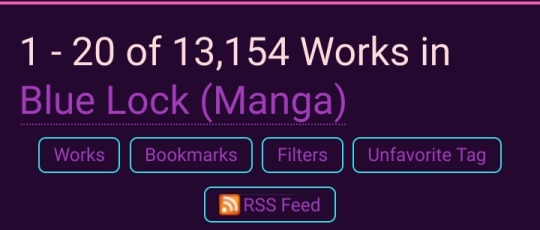
Blue Lock: AO3 statistics and fanfiction meta
Blue Lock (Manga) has more than 13,000 works on AO3! 🎉 The corresponding figure for Blue Lock (Anime) is about 7,900 or so.
Just under 230 works are tagged exclusively as Blue Lock (Anime), while there are just under 5,500 works tagged exclusively as Blue Lock (Manga). As expected, around 7,700 works are tagged under both fandoms.
I'm procrastinating today, so here's a high level analysis of the Blue Lock works on the platform. Given the low number of Blue Lock (Anime) exclusive works, I excluded these and reviewed only works that included the Blue Lock (Manga) tag. I didn't exclude crossovers, due to the aforementioned dual-tagging.
Firstly, here's the lowdown on pairings:


On the left: Works tagged under Blue Lock (Manga), without any additional filtering. NagiReo, KaiSagi and RinSagi nab the top three pairing placements, with NagiReo comfortably leading.
On the right: Same fandom tag, but inputting the search term "otp: true" into the "Search within results" field. This returns works with no more than one pairings tagged (i.e. excluding any works that have two or more pairings tagged). This includes any fics with no pairings tagged, platonic (&) or romantic/sexual (/). This filter yields approx. 8,600 works.
This doesn't affect the top three most-tagged pairings, but it reshuffles the other parings more significantly. For example: we can see that 55% of BachIsagi-tagged works feature other pairings, and it drops a ranking. KuniGiri-tagged works fare similarly, and the split is even more pronounced for RyuSae and NagiSagi.
KaiNess jump from 9th most tagged pairing overall to 5th most tagged amongst fics that only tag one pairing—lapping Kunigiri, and potentially an indicator of a recent boom in works for this pairing. The controversial RinSae goes up one place in the rankings under this filter.
The two searches show that nine pairings remain on top, regardless of whether works tag them in tandem with other pairings or tag them as solo. However, Isagi Yoichi/Everyone falls out of the rankings when the otp: true is applied. This is logical, given this pairing is frequently tagged alongside other Isagi slash tags. Filtering this way reveals that RyuRin is the tenth most tagged pairing in single-pairing works.
More discussion on pairings, ratings and tags, plus a comparison to others sports animanga under the cut!
It's also possible to use "otp: false" to show only fics with multiple (2+) relationship tags, which yields about 4,500 works. The results of this search are below:
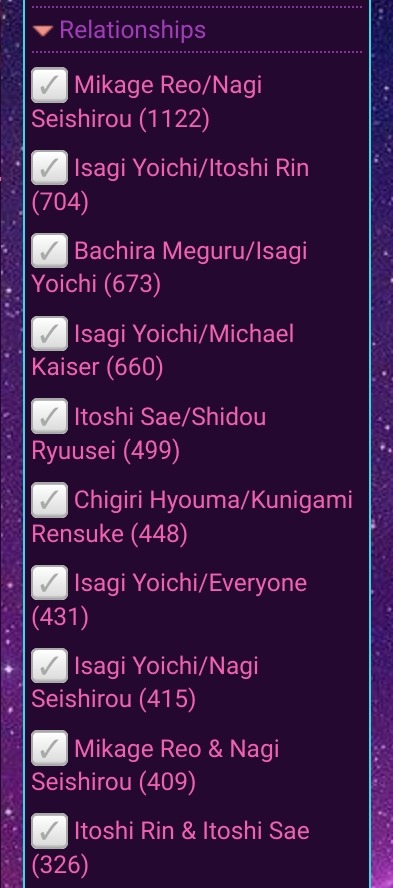
Here, BachiSagi just about pips KaiSagi to round out the top three—but if trends persist, the number of KaiSagi works will soon grow at a higher rate, leaving the top three ships in the manga fandom undisputed.
Meanwhile, KaiNess and RinSae drop from the top ten, displaced by Nagi&Reo and Rin&Sae (platonic pairing tags). Not too surprising for the latter—due to taboo, works featuring RinSae tend to be standalone.
With KaiNess, it's simply that the two platonic tags are used more often in multi-pairing works, which makes sense given the relative recency of Kaiser and Ness's introduction, and the fact that they're still manga-only characters. A related search revealed KaiNess would most likely be the eleventh most-tagged pairing in multi-pairing works (296), followed by Bachira&Isagi (platonic pairing).
What about ratings, and the most popular non-pairing tags?
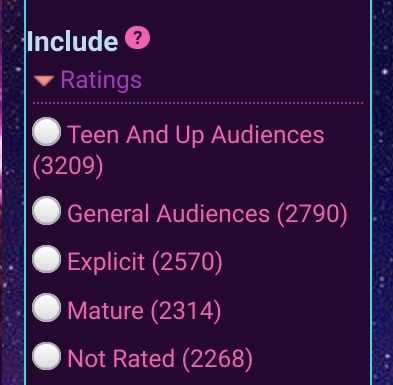
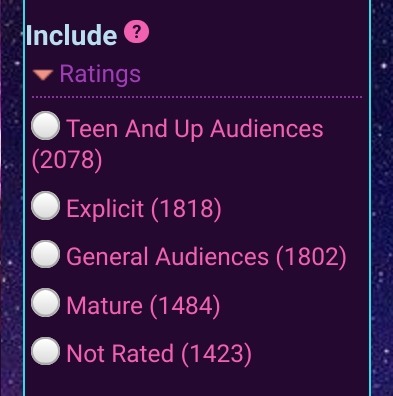
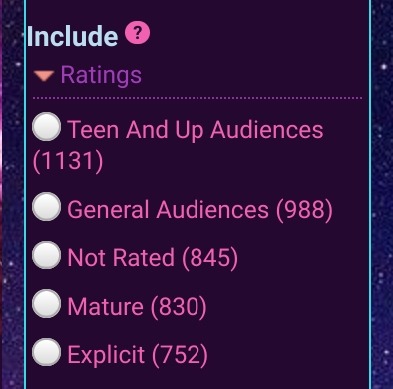
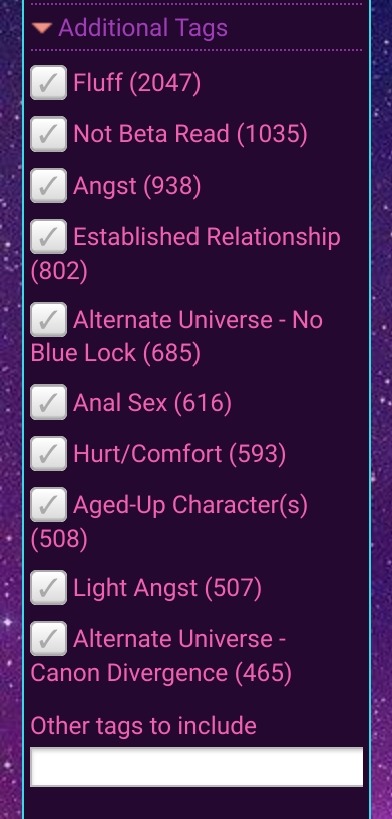
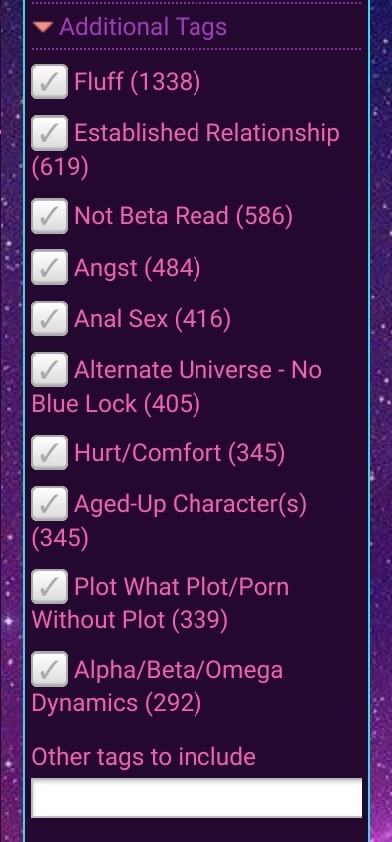
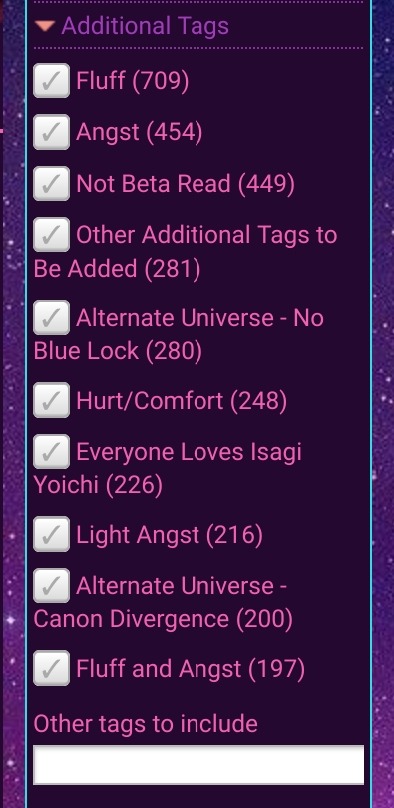
On the left: results for all Blue Lock (Manga) fandom works.
In the middle: results for Blue Lock (Manga) fandom works filtered by "otp: true".
On the right: results for Blue Lock (Manga) fandom works filtered by"otp: false".
To reiterate, the search feature just reports the most frequently occurring tags. Even the most common tag, Fluff, features on only around 15% of works.
There's not too much divergence caused by filtering. One observation is that filtering by "otp: true" returns a higher ratio of explicit works—this is supported by the tags that appear in that respective top ten.
Overall, the most popular tags in Blue Lock works are Fluff, Angst, "No Blue Lock" and "Canon Divergent" AUs, and Established Relationship... not to mention, good ol' reliable buttsecs.
Although not a rigorous (read: percentage tested) exercise, I compared these results to the most frequently occurring tags in other sports animanga fandoms in AO3 with the following observations:
Free! works have higher incidences of Romance, Smut, PWP and Friendship tags than Blue Lock does 🏊♂️
Haikyuu!! didn't have any sex-adjacent tags in its top 10, but otherwise reported similar trends to Blue Lock. One exception is a notably high incidence of the "Friends to Lovers" tag 🏐
Yuri!!! on Ice has a frequently occurring fandom specific tag ("Character's Name Spelled as Viktor"), and in additions featured "A/B/O dynamics" among its top 10 most common tags. Otherwise, it most resembles Free! in tagging trends ⛸️
SK8 the Infinity meanwhile mirrors Haikyuu!! in terms of frequently occurring tags, although with more common incidences of "Anal Sex" and "Post Canon" 🛹
In short, nearly all sports animanga including Blue Lock report high incidences of the following tags:
Fluff (and/or) Angst
Established Relationship
Alternative Universe (various)
Hurt/Comfort.
This doesn't tell us a whole lot, given these are popular tags for nearly every fandom. However, they are trailed in popularity by the tags Getting Together, Romance, Smut, PWP, and Friends to Lovers. These are more indicative of the shipping culture in sports animanga, including the fact that character relationships in these fandoms are generally pre-established.
As for ratings, It's hard to make a judgement on whether Blue Lock (Manga) works lean more towards a universal or teen readership, or towards being more mature/explicit in nature. This is due to a high incidence of "Not rated" works. Works may be categorised as "Not rated" for any number of reasons: authors avoiding spoilers, authors relying on tags for identification, or authors not knowing how to categorise their own work, or even opting not to categorise an ongoing fic because they are yet to decide the direction of the work.
That said, filtering by "Not rated" alone didn't yield a higher incidence of explicit tags, like filtering by "otp: true" did. So there's limited evidence that "Not rated" fics trend towards mature or explicit content in excess of general trends. All the same, where in doubt, it's best to refer to a work's additional tags to assess its content, as the rating may not always make this clear.
A long read, catering to a niche audience (read: my nerdy ass) but if you've made it this far, I hope you found it of interest!
#blue lock#bllk#blue lock meta#archive of our own#ao3#fandom#fandom meta#blue lock fanfiction#bllk fanfiction#sports anime#sports manga#boinin talks bllk#long post#mine
37 notes
·
View notes
Text
Hello owl fans, I wanted to give my critical breakdown on When I first watched Owl House, now rewatching it, looking back at a well known character in
This very 3 part topic focusing on
Everyone's fan favorite Amity who I like to call
(Little Miss Self Insert) Amity analysis & why she’s popular

Literally the same (Real) hair color as the creator
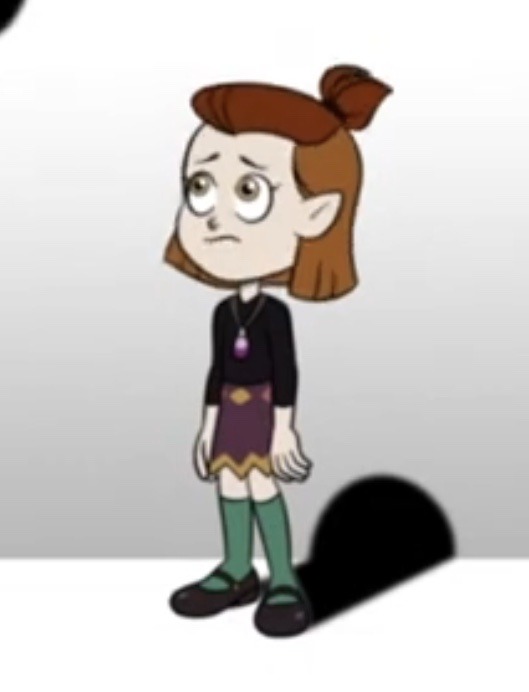
DISCLAIMER THIS IS NOT AN ATTACK ON THE CREATOR But a Critic that could benefit the show & educate viewers, POC, BIPOC (Bi meaning black indigenous, Person of color) REP,
(don't Hate appreciate), if ya can't Face different opinions or anyone with an open mind who can critic just being nasty/policing people, There's the Portal Door to outer space.
Ok aight Lets start to this 3 PART topic post
I indeed love my run of Amity as a character because she made an impactful LGBTQ show great, along with her endeavor on how she developed as a character. ( Also Green Hair AMity is Better.) because she had great drive melding her into the person she is, having to face her parents, falling in loving with luz.
Due to the high demand being a lgbt character at times, (even though we been starved and wanting more rep) has at times repercussions and flaws,if the writing, narrative & pacing is compromised in the show which shown after rewatching the series ANOTHER TOPIC.
I'm fully aware that she's a well-known fan favorite character ever since the show's green light along the panel interview with Dana Terrace hyped her up during the debut panel of the other shark cartoon she worked on, DOWN BELOW
youtube
After Rewatching the show I felt there was more to her then just being luz girlfriend,
(like other characters to never get there titular moments at time like the Hexside students.)
and how she was written in a one-sided straight forward manner which people overlook cause we had proud lgbt content to gush over, googling, blushing eyes and the creator saying no romance in the series yet we have a two girls hogging peoples potential and spotlight?!
which contributed to her name trending more & talked about compared to our main POC character (which I find weird & Staggering at times.)


Theres proof from a Good post on here THATS IMPORTANT BELOW
Now we got that outta the way 3 major reasons LETS GO
The Favoritism
I feel the favoritism in fandom really says about how the show reacts TO OUR favorite characters, yes a world and great characters can be executed in titular episodes or moment you can let them see shine,
but diving into the season 1 of the show had its Rocky start till they started the real action in season 2 not to mention the kiss scene which put everyone on good edge however hogged (a titular poc spotlight.)
There's proof on how poc people in real life are depicted in media as something negative and gross yet caucisian people are giving everything handed to them in a silver spoon.
so here's a article ill bring up cause these types of behavior says in how poc see ourselves
Heck thats how we got that lumity controversial pic
(IF YA KNOW YA KNOW)
ill pull up with article on black media effects real life
I truly did feel the intent on the show at times was made selfishly at times,
Which there's a link about a unique article that sheds some light on this situation on how it treated Amity and why she was made into a self inset character. Showing relationship run throughout the show.
you can be able to write a good cartoon series and make an impact on fans, spilling your life on the show you care being in there shoes,
However don't let it sacrificed the many aspects excusing plots, and narrative with tonal whiplash & poor characterization.
Hope Your here with me now lets get on to
Shipping discourse
these girls took over the whole world by storm, to the point the fandom only cares about these girls, nothing beyond,
(social media numbers don’t lie on searched characters and many aspects on the owl house.)
if not them but solely for Amity herself. which I felt really was a selfish writing move. Cause I really did love the character until she was written good however shoehorned to being a hollow shel of herself and discourse did no favors.
It irks me to no end cause we have a prominent poc character said previously, who gets not talked about a yet amity is the one y’all favor to? At the point y’all really don’t show y’all don’t care about black, Poc, or BIPOC and there contributions to media.
it pains me to see a show like this has been nothing but a whole show of contradictions and ill-pacing,
And i know why we stand with the ship or any sexuality reveal with any character to gain a following or popularity for that matter is this a good term of how we gotten lgbt media uprising
(which I understand we crave years ago. )
PERFORMATIVE SEXUALITY (Article & Term HERE .)
Not to mention the celebrity worship yall put onto amity herself which is responsible for it
Where gonna make this quick so last session and hoep you have a good one afterwards thanks
The Colorism Issue (Glad fans are speaking out)
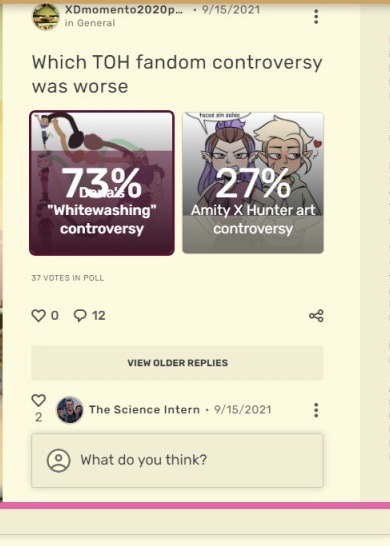
Its just facts that we see white or white-passing as something to be congratulated and praised for compared to what poc go through cause we POCs & myself have to work tens time harder for what we want, (one issue for another session is?)
WHY IS THE NOCEDA FAMILY HAVE DIFFERENT SKINTONES?!
FIX IT Titan

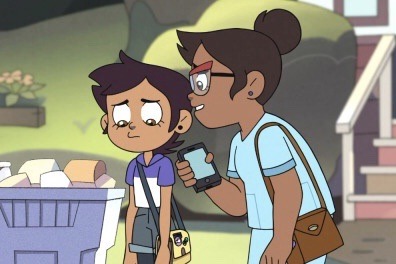
For media especially Disney has treated Poc if not BIPOC IN live action if not animation to an extent is degrading, you have kids on jessie acting any way without severe repercussions such as how they Treat BIpoc Characters with utmost disrespect. Which is shown throughout our favorite shows. (also shows how the show loves it kids cause it suffers no consequences.)
Now May wonder why i put in Princess & The Frog
We do see great chemistry to the show and movie example
The similar girl dynamic that will be is Tianna and charlotte
There relationship is done better, I do feel there was little bit of colorism played into this and alas not to mention tiana poc friends characters being black but non existing, however I do feel to a agree they really stretched on how we should have diversity in a negative way which I’ll get into in a sec.

Its at this point charlotte is the sweet spoiled girl and felt amity was favored cause of how she was written that way, they tried to make her favorable because you guess or see she’s WHITE.
Which shows not only poc characters are secondary in animation or forms of media, also how Luz is written in a white space, but with amity
She was gonna be depicted as a favorable one cause of how she was written LIKE CHARLOTTE
(To the point people started seeing charlotte as the main character form princess & the frog.)
Having the cultural representation & also inconsistent characterization shine to the point where we could’ve had great characters shown and debut yet
Have two girls take over the show as a whole really?!
oh reminder the diversity happen yet being sacrificed for a shoehorned lgbt content and activism to the degree it over whlems the show with
amity being a type of reverse mammy to make her look better for luz to counter her spicy latina ways, like a unruly tomboy to kiss the white favored girls booty, knowing full well the fandom will police anyone saying otherwise.
The article I’ll show about gearing our diverse audiences which I feel Disney needs to do a lot better on cultural representation, and harmful stereotypes as this.
ARTICLE ON HOW STEREOTYPES CAN BE IN MEDIA
Hoping I said it well, since there's so much to add to this however hope we can be reasonable on the comment section, so hoping we can have a civil discuss on about this topic thanks for reading this far you have a goodnight and great day where you are
with love kyoko cane
#toh amity#toh#lumity#luz X amity#luz noceda#amity blight#toh critical#toh critic#toh criticism#amity has flaws her being temperamental is not a excuse#the owl house#youtube#theowlhousefandomsitdownandlisten#amity is a self insert#theowlhousefanslisten#white favoritism#the relationships are not perfect#escapism is not realism#flawedstorytelling#why does amity deals with luz bs your not a healthy relationship#amity sis why you overshadowing everyone i know why#anti lumity#dana terrace#the owl house needed work on execution in writing#performative bisexuality#ask Kyoko cane#colorism#the owl house criticism#lil miss self insert#tinella is a red herring
20 notes
·
View notes
Note
He can literally TELL HER that stuff bothers him and she more often than not just continues talking about her side of the matter, barely acknowledging anything he says at all beyond what little overlaps with her side.
This line from familyagrestefanblog remind me that this is what happened in Wishmaker. Cat tell her that he doesn't have any childhood dreams and she just... brushed it off, saying "Oh you're probably forget" and then listing the potential dream that she thought he might had. It's as if the conversation is just there for the sake of breaking the silence (because Cat has been mostly quiet during the battle) and not for the sake of her trying to get to know her so called favorite partner and it's so grating.
I remember years ago you made an analysis how Ladybug took Cat's presences and kindness for granted and that he's just convenience for her and I was upset then, be ause that wasn't what I see from their dynamic. But watching s4 and 5 make me realize that it really is the case, that Cat is just a convenience for her and that upset me more.
To quote from one of my favorite manhwa :
Doubt is the best thing you can do to deeply understand the other person, trustly the other person rahsly and blindly is the same as not trusting them.
---
Yeah, my takes on Marinette have always been just too spicy for some people. Although, I’ll say to your credit that I had no idea that the Fae Cat Noir interpretation was controversial because everyone was just so polite about it. I do remember that a lot of Marinette fans had also been noticing that Marinette compartmentalized her double life into two separate boxes that shouldn't overlap. Of course, it could be that the idea let people think it's not a big deal she forgets about Cat Noir when he isn't in front of her, because she does this with everything relating to her job as Ladybug. Frankly, I think the fact that she does that to such a degree just shows how unmotivated she is, but I used to think she was just being the reluctant hero archetype and wasn't expecting the writers to claim her failings as a hero are a victory.
And that's the thing with a lot of my past criticisms of Marinette; I never used to really hold them against her because I thought they'd be temporary. I used to think all of her failings as a friend, partner and hero were supposed to be signs of her immaturity. I thought that, as Marinette grew as a person and hero, she'd learn to overcome many of her failings and grow into a more dependable person, because that's an empowering story to tell young girls, that them being awkward and weird now doesn't mean they can't make their own path in life. This is why I adored Marinette as a character despite disagreeing with her values so much.
But now the writers have decided that "empowerment" means excusing all bad behavior instead of becoming better. I don't think telling little girls that their friends should just shut up and be understanding when they make every mistake under the sun and refuse to improve is empowering. It could be cathartic, I guess, to fantasize about yourself as the queen of the universe like that, but it's no way to write a supposed role model that should be emulated.
23 notes
·
View notes
Text
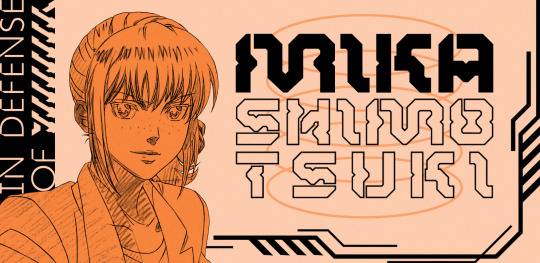
An Essay Exploring Psycho-Pass's Most Controversial Character
I know I’m opening a huge, slimy can of worms and potentially incurring the wrath of half the Psycho-Pass fandom, but I feel compelled to share my feelings on Mika Shimotsuki and how I believe she serves as a lightning rod for fan culture misogyny. Now, before I start, let me just say that this essay isn’t targeted at any one individual, and it’s just my personal opinion, which you are more than welcome to disagree with. I’d also like to stress that, despite my love for Mika’s character, I’m going to try my very best to approach this topic from an academic standpoint rather than an emotional one. I recently picked Parasocial Relationships and their effect on female celebrities and fictional characters as a thesis for my Gender and Media course, and it really got me thinking about this anime in particular, so here we go…
Let’s tackle the female side of things first, because it’s the one that shocks and disappoints me the most. Don’t get me wrong -- I think fandoms with a strong female presence are awesome, complex, uplifting, and oftentimes incredibly positive and inclusive spaces. I love being a female genre fan and interacting with other female genre fans. That said, I’ve noticed female fandom can sometimes fall prey to online bullying and misogynistic groupthink when it comes to (a) female characters they find arrogant, bossy, mean, etc. and (b) female characters who are positioned as potential love interests for their collective male "blorbos," "husbandos," "faves," whatever the term may be. These two things very often overlap, which I’ll touch on later, but for now, let’s talk about the first point.
There was a big movement online several years ago urging creators to “let women be mean. Let them be angry. Let them be petty and complex and difficult. Let them be messy.” I fully support this idea in both theory and practice and wish it were that simple, but unfortunately, it’s not, because uncomfortably large swaths of fandom don’t like/appreciate unapologetically mean female characters the way they do male characters. Men in fiction are allowed to be cutthroat, selfish, cruel, narcissistic, arrogant, and even evil without garnering even a fraction of the judgement that female characters receive for simply being “difficult” or “unlikable.”
Take, for instance, Shougo Makishima. The Psycho-Pass fandom at large adores this character (myself included), despite the fact that he’s a remorseless sociopath who touts the importance of free will as a wholesale excuse for murder. He is a bad person, full-stop, and yet he garners love -- even sympathy -- in abundance. He’s the subject of fawning fan fiction, chibi art, thirst tweets, and endless Reddit analysis. Fans are capable of seeing him, murderous warts and all, as a product of the warped dystopian society Sibyl has created. But Mika? Nope. Just “a bitch, a whiner, an arrogant little girl who deserves to get slapped in the mouth.” (I am not making this up. These are the type of comments I see *female* fans making left and right about her character). She receives far more hate for giving up the location of Akane’s grandmother as a blackmailed, frightened teenager than Makishima does for slashing Yuki’s throat or blowing up Masaoka. Hell, she catches more heat for Akane’s grandmother than Sakuya Togane, the woman’s actual murderer and -- I can’t stress this enough -- a 41-year-old adult man.
Now, I know what some of you are thinking -- Makishima and Togane are villains, so their personality flaws (putting it lightly) and horrible actions are essential to the narrative and indicative of good storytelling. We’re meant to “love to hate them.” All correct, and yet this doesn’t change or excuse the fact that their standing in the fandom, when compared to the equally complex and emotionally fractured Mika, is textbook pernicious misogyny. But, for the sake of argument, let’s compare Mika to another character ostensibly on the side of good -- Nobuchika Ginoza. [Note: Ginoza is my favorite character in Psycho-Pass, and any commentary regarding his PP1 shittiness is made with pure love and appreciation for him and nuanced character growth in general.]
When we first meet Ginoza, he is rude, terse, unyielding, intellectually smug, and totally unforgiving of those closest to him. He’s a brilliant character, and his behavior, no matter how insufferable and seemingly cruel, is the result of compounded trauma -- the trauma of having his father ripped away when he was only nine, the trauma of being unfairly judged for the “sins” of said latent criminal father, the trauma of his mother numbing her pain with medication and eventually becoming something akin to a human corpse, the trauma of finding a new support system and best friend in Kougami only to once again be “abandoned” for the other side of the law. In many ways, he’s still a hurt child lashing out at the world, unwilling to see it for the complicated, morally gray place that it is, because being mad is easier. Telling himself that Enforcers are nothing more than dogs for him to guide and use as shields is easier. Blindly trusting the judgements handed down by Sibyl is easier.
In this way, he and Mika are remarkably similar. When she first joins the MWPSB, she’s a 17-year-old minor whose best friend (and probably first love) was dismembered by a latent criminal under the direction of a serial killer disguising himself as a teacher -- a trusted authority figure. She’s filled with guilt and self-loathing over her failure to act, and the easiest way for her to sort out her feelings and ensure the same thing doesn’t happen again is to harden herself to all latent criminals. Distrusting them, treating them as “other,” is her form of self-preservation. Yes, it makes her come across as mean, as closed-minded, as unlikable, but that’s not a bad thing. It’s good storytelling, and it presents her with plenty of potential for growth, which she is certainly given.
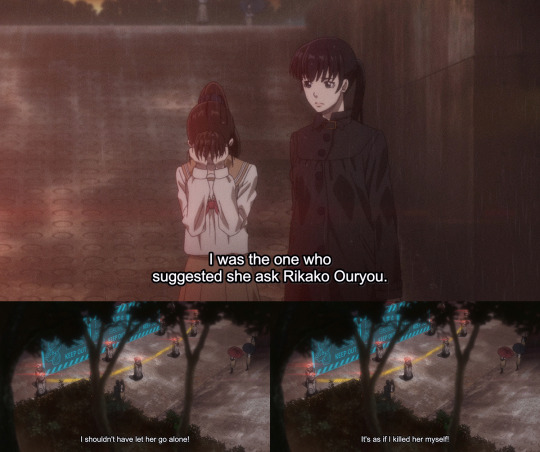
[Upon discovering that her best friend, fellow Oso Academy student Kagami Kawarazaki, has been murdered by Rikako Oryo, Mika breaks down in tears, blaming herself for the tragedy. This is the moment her distrust of latent criminals is solidified.]
But, unlike Ginoza (a 28-year-old adult man), over half the fandom decided that Mika was so awful, so totally unforgivable, such a “heinous cunt,” that they were unwilling to allow her the time and space to grow beyond her trauma and immaturity. But why? Is it because we’ve been taught to judge women, even fictional ones, based on a different set of criteria than men? I think the answer is obvious, and I urge fans who dislike Mika’s character with such intensity to seriously examine their reasoning. I don’t mean to say that she’s infallible (hardly) or that it’s wrong to dislike her. Everyone is entitled to their opinion, and no one person’s take is more valid than another’s, but it’s definitely something to think about in the larger conversation that is media analysis.
Which brings me to Akane Tsunemori, someone who fits all the abovementioned criteria for a “likeable” female character. [Another note: I love Akane, and none of this is meant to disparage her. I am simply trying to point out that she’s a more easily digestible female when viewed through the patriarchal lens of pop culture.] She’s smart but not arrogant about it, strong-willed but never disagreeable, empathetic but not easily led by her emotions, and most importantly, she’s always kind to the fandom’s male faves. She is, in almost every way, trademark "Best Girl" material, and Mika is her foil (at least in PP2). She’s set up to be the anti-Akane, both in personality and narrative function. If Akane trusts someone, Mika doesn’t. If Akane wants to bend the rules, Mika is rigid in upholding them. If Akane isn’t afraid of clouding her Hue, Mika is downright terrified.
Though it’s never stated outright, she probably hoped her senior Inspector would serve as a mentor figure, yet we see none of that from Akane, who often abandons Mika to chase down seemingly wild leads and appears to be stuck in the past, yearning for the original Division 01. (Mika even says as much to Ginoza in a novelization of the first film.) On top of that, I think it’s important to remember that we’re predisposed to side with Akane, as she is both our POV protagonist *and* the hero of the narrative. We have unprecedented access to her private moments, motivations, and methodology. We know she means well and trust that her unconventional strategy will pay off in the end. Mika does not. All she knows is that her direct superior is habitually breaking the rules, overloading her team with what feels like excessive busywork, and ignoring the more bureaucratic side of the job in favor of unconventional/unsanctioned detective work. If I’m being perfectly honest, I would also be submitting concerned reports to my boss.

[When Akane blatantly disregards Sibyl's judgement of bomber Akira Kitazawa, talking him down from a Crime Coefficient of 302 to 299, Mika confronts her for putting both their colleagues and nearby civilians in danger. This later proves to be the right call, as Kitazawa attacks Inspector Risa Aoyanagi and escapes police custody.]

[While investigating Kirito Kamui, Akane keeps her suspicions/theories close to the chest, leaving Mika and the rest of Division 01 in the dark as to her game plan.]
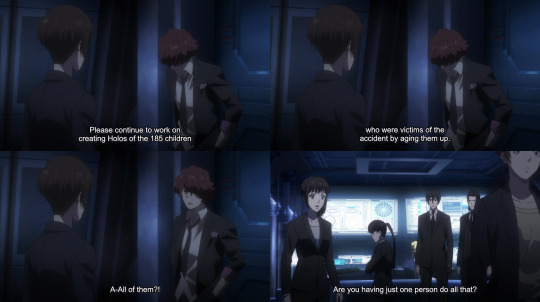
[Although Akane's decision to entrust Hinakawa with all 185 Halos proves to be the right one, it's understandable why Mika is taken aback by her placing so much responsibility on a single subordinate -- especially one with Hinakawa's history.]
Now, that’s not to say Mika’s feelings about Akane are purely altruistic. She’s definitely jealous of her senior Inspector and resents her standing within the Bureau, which makes her behave in ways both petty and vindictive. But I’d argue that this, too, is understandable, if not wholly forgivable, when viewed through Mika’s eyes. Picture this: You’re the youngest-ever recruit to a highly coveted position. You follow protocol to a T, are deferential to your superiors, and show a genuine aptitude for the job. Even your callousness toward the Enforcers (again, your childhood best friend was butchered by a latent criminal) is in accordance with Sybil’s will. Shitty, yes, but standard for someone raised within the Orwellian hellscape of 2100s Japan. And yet, everyone around you prefers your senior Inspector. Your subordinates defer to her when you’re the officer in charge (Hinakawa) and even help her game the system (Ginoza). The Chief tells you you’re boring, but displays obvious favoritism toward her. This severely harms your self-esteem and colors the way you interact with everyone around you. After all, it’s hard to feel like a valued member of the team when you’re being undermined and lectured at every turn. This doesn’t excuse Mika’s behavior, and if she didn’t evolve, I might understand some of the hate, but she does evolve. Spectacularly. She’s just not Akane, and that’s okay.
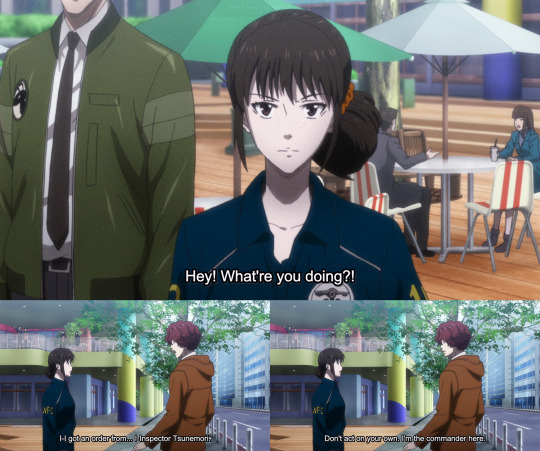
[While dealing with the hostage situation in PP2, Mika notices Hinakawa working on something off to the side. When she confronts him about it, he admits that he's acting on Akane's orders, even though Mika is technically the officer in charge.]
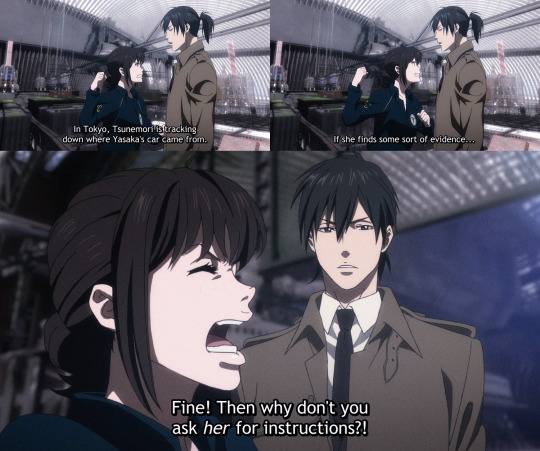
[A similar incident occurs in Sinners of the System: Case. 1, when Ginoza shoots down Mika's (admittedly ridiculous) plan, which she interprets as him once again siding with Akane over her.]
Again, this is good storytelling at work, and you can acknowledge that these two women are diametrically opposed and still appreciate -- hell, even like -- both of them for the well-written characters they are. After all, most Psycho-Pass fans like both Kougami and Ginoza in PP1 despite their many differences, not to mention the fact that Ginoza is (and I say this with love) a giant asshole. Let’s not forget, he was *this close* to microwaving Kougami at Chief Kasei’s behest. You can tell yourself he wouldn’t have, but are you sure? Are you really sure? But we forgive him, because he’s a man. Anyway, back to Akane and Mika. For reasons I’ll never understand, many fans find it borderline impossible to love two women with beef, whether it’s one-sided or mutual. There can only be one Best Girl, and everyone better be on her team. It reminds me of the Sansa vs. Daenerys discourse that gripped the Game of Thrones fandom in its last few seasons. This is doubly ridiculous in Psycho-Pass’s case, because Akane and Mika come to trust, respect, and depend on each other. But people decided to hate this 19-year-old forever, so none of that matters.
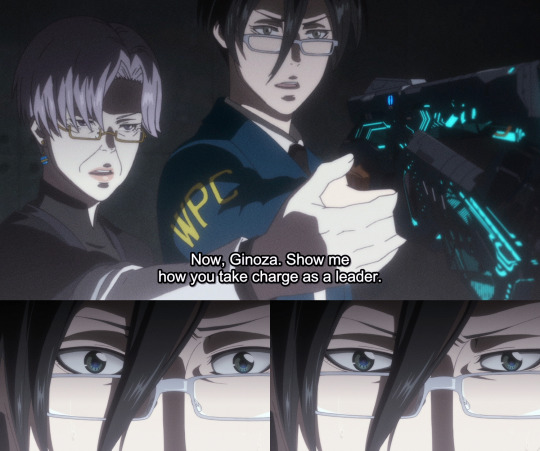
[Notice how Ginoza's gaze narrows ominously in the last frame, suggesting he might actually have pulled the trigger, thereby killing his best friend, had Akane not intervened.]
Now, let’s return to my earlier point about certain fans irrationally hating any female character they deem unworthy of their blorbo, husbando, etc. This is where Parasocial Relationships become extremely interesting. As mentioned above, Ginoza is my favorite character in Psycho-Pass, which I think is pretty common. While I myself have never been one for self-insertion or creating OCs to pair with my favorite characters, I understand that it’s a popular trend, and if you enjoy it, more power to you. It becomes problematic, however, when those who engage in self-shipping/OC-shipping decide to collectively gang up on the female character creators have paired (or hinted at pairing) with the object of their affection. Enter GinoMika. Now, I know what you’re thinking -- “But Mika’s a lesbian!” I don’t necessarily agree. Do I think she was in love with her best friend at Oso Academy? Yes. Do I think she had a crush on Yayoi at the beginning of PP2? Yes. Do I also think it’s obvious she currently has feelings for Ginoza, which have been steadily growing since Sinners of the System? Absolutely. For this reason, I interpret her as being both bisexual and demisexual. But that’s beside the point --
The point is that many Ginoza fans who ship him with themselves, their OCs, or Akane (remember, she’s Best Girl) seem to enjoy trashing on Mika like it’s an Olympic sport. And when I say “trashing,” I don’t mean your normal yet still disappointing level of ship nonsense; I mean unhinged, violent rhetoric that makes me feel like the Internet is a place where women can never win. And why? Because she was mean to him when she first started working for the MWPSB? As if he was oh-so-kind to the Enforcers who worked under him. I seem to recall him screaming at his father and threatening to “make him pay” for visiting his sick wife without permission. Oh, and then there was the time he introduced Akane to her new colleagues by telling her, “Don’t think that the guys you’re about to meet are humans like us.” But yes, Mika once told him that she didn’t want his opinion as a latent criminal, which is so much worse. And before you can say that she’s still a bitch to him, let me point out that she is a textbook tsundere. That’s how she flirts, shows affection, etc. She can never come right out and say what she means, because that would make her vulnerable. But she can surreptitiously tell Ginoza he better come back alive by insisting he return her special Dominator. You know, because it would be a real hassle if she had to replace that thing.
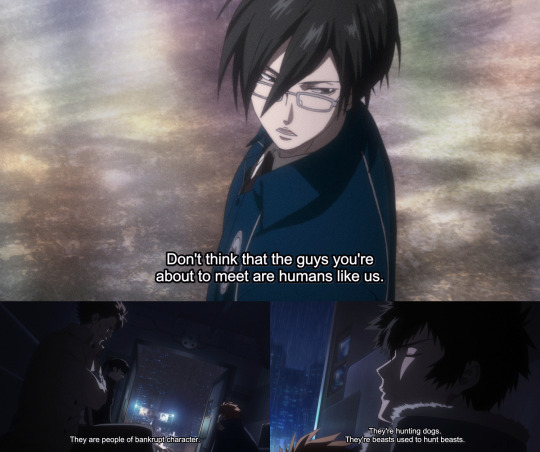
[The language Ginoza uses when introducing Akane to the Enforcers, including his own best friend and father, is deeply dehumanizing.]

[When Aoyanagi takes Masaoka to visit his estranged wife, Ginoza reacts with explosive anger, reprimanding his father in front of their colleagues and threatening to retaliate should he do it again.]
Which brings us, at long last, to the male portion of the fandom. While many female fans like to call Mika out for her more negative character traits, completely ignoring any and all growth she’s experienced since PP2, male fans tend to direct their anger, dislike, etc. in a much more aggressive manner. I wish I was exaggerating when I say that I’ve seen multiple posts praying for Mika’s rape and subsequent murder. You can’t dive into a single “Season 4 Wish List” thread without finding at least one person wishing extreme ill on Mika Shimotsuki. It's pure misogyny, classic “I’ll fuck the bitch right out of her” rhetoric, and it has no place in this fandom or any other. You would never see a male character being talked about in these terms. Consider this: There’s more fan fiction featuring Mika being raped or coerced into sex by her tormentor, Sakuya Togane, than her having a positive, consensual experience with any other character. Love her or hate her, that is extremely fucked up. We as a fandom need to do better, because once this type of misogyny can be weaponized against fictional characters, it becomes much easier to use against real people. Fan culture, though it might seem trivial, says a lot about us and our values.
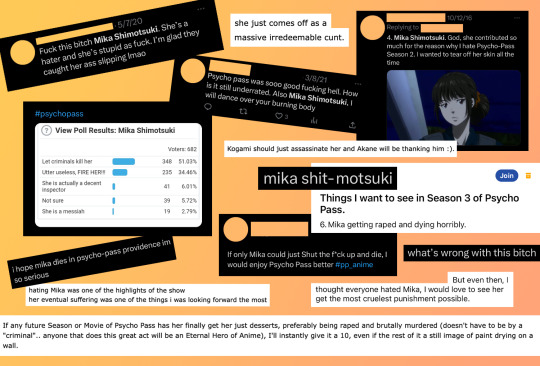
[This is just a sampling of the comments you'll find on Twitter, Tumblr, Reddit, and other social media sites.]
That said, I’d like to end this essay on a more positive note, so let’s take a look at all the ways in which Mika has become a better, more compassionate human being over the course of the series...
By PP3, she shows obvious concern for her Enforcers, values their opinions, and treats them like integral members of her team. In an especially cute scene, she even fist-bumps Tenma Todoroki after they work seamlessly to defeat Koichi Azusawa’s henchmen. She also makes a point to attend the party thrown in the Enforcers’ quarters, as she now longs to be part of the gang -- a gang she would have actively shunned in PP2.
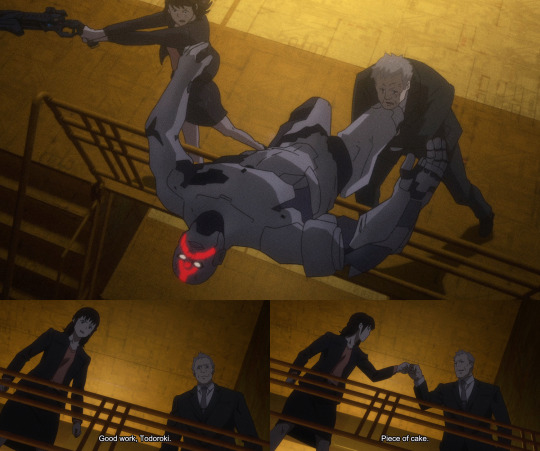
[During First Inspector, Mika shows time and again that she's willing to work with and for her Enforcers.]

[As Chief, Mika realizes that Enforcers deserve respect and gratitude from their superiors. They are no longer dogs to her.]
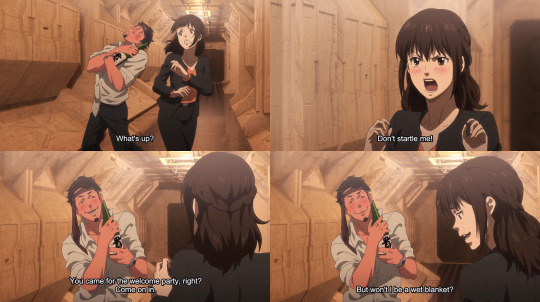
[In PP2, Mika tells Ginoza she doesn't care what the Enforcers think of her. By PP3, however, we see her display concern that her team might find her dull. She wants to be liked and accepted by them.]
She becomes far more flexible with her co-workers, allowing Inspectors Arata Shindo and Kei Mikhail Ignatov plenty of freedom to conduct investigations as they see fit. Yes, she consistently scolds them (textbook tsundere behavior), but this is done in a manner far more humorous than anything else. We know she actually trusts them and has their best interests at heart; she just can’t bring herself to say it aloud. She also repeatedly takes heat from Chief Hosorogi on their behalf and is genuinely worried for Arata when it seems like Sibyl might “eliminate” him. The palpable relief on her face when she finds out he’s allowed to remain an Inspector speaks volumes.
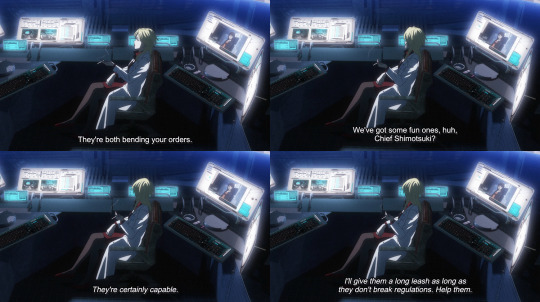
[Throughout PP3, Mika allows Kei and Arata to play to their individual strengths, even if it means bending the rules -- something she would never have done in PP2 or the first film.]
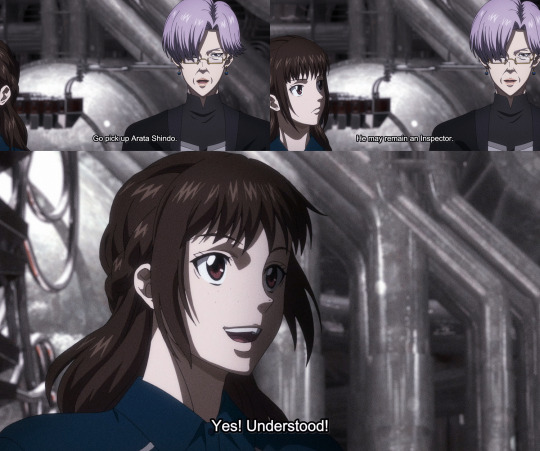
[Just look at that excited face. No caption necessary.]
She goes out of her way to make sure the immigrant prostitutes saved by religious leader Joseph Auma are protected following his death. This is an especially big deal, since many of these individuals are latent criminals, and Mika is forced to ask her newfound nemesis, Frederica Hanashiro, for a favor in order to secure their safety. When she tries to pretend it’s no big deal, Frederica calls her bluff by pointing out that no one would stoop to asking someone they hate for help in order to protect people whose fates they don’t care about.
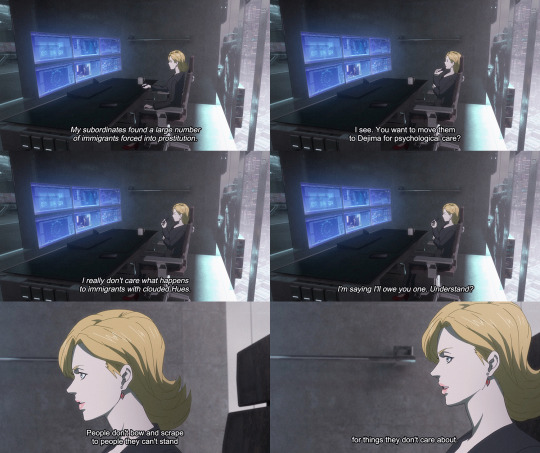
[Even though Mika detests Frederica, she puts the well-being of the immigrants before her own pride.]
In Sinners of the System: Case. 1, her distrust of latent criminals is permanently altered after dealing with Izumi Yasaka, whom she works tirelessly to rescue and comes to view as brave, capable, and worthy of reintegration into society. She also displays genuine concern for and lack of discrimination toward Takeya Kukuri, the young son of a latent criminal, and is horrified to discover that the latent criminal inmates at Sanctuary are being used as disposable tools to move nuclear waste canisters.
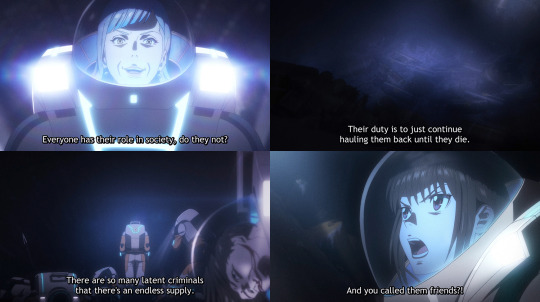
[Sinners of the System: Case. 1 marks a decided shift in the way Mika views latent criminals. Instead of lumping them all together, she begins to see them as individuals who deserve basic human rights.]
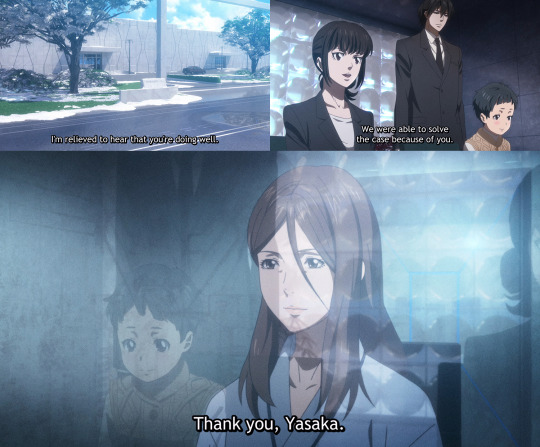
[Even though Mika is unable to save all the latent criminals at Sanctuary, she does everything in her power to ensure Yasaka and Takeya walk away clean.]
When Enforcer Mao Kisaragi turns out to be the “fox within the CID,” Mika and the rest of Division 01 are united in supporting her claim of innocence. Mika trusts (without concrete proof, mind you) that she’s telling the truth about being an unwitting accomplice, something she never would have done in PP2 or even the first film.
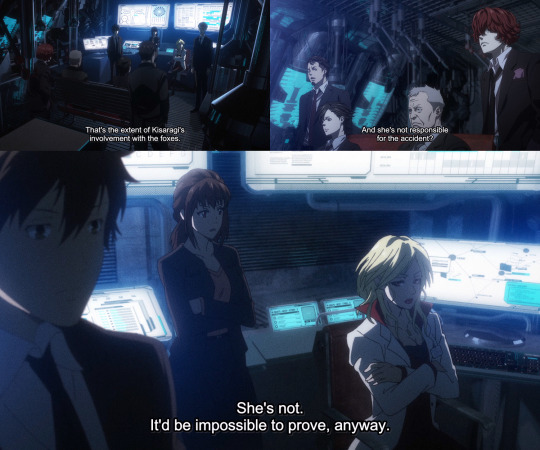
[While the old Mika would have been the first person to distrust Kisaragi, here we see her standing up for the beleaguered Enforcer.]
She comes to respect Division 01 (Akane, Ginoza, Sugo, Hinakawa, Kunizuka, and Shion), views them as a surrogate family, and misses them once their unit is disbanded. In Sinners of the System: Case. 3, Frederica Hanashiro, who temporarily worked as part of their unit, says, “CID Division 01… They’re not just capable; they have a rare teamwork that overcomes the barrier between Inspectors and Enforcers.” Yes, this is mostly due to Akane’s guiding influence, but it’s clear Frederica is talking about the whole team. It’s taken Mika years to get there, but she is now definitely part of the group, not a jealous outsider looking in. In fact, even Mika’s obvious dislike of Frederica in PP3 is a clear result of this affection. After finally finding a place to belong, she feels as though Frederica swooped in and stole her found family, leaving her right back where she started -- on the outside.
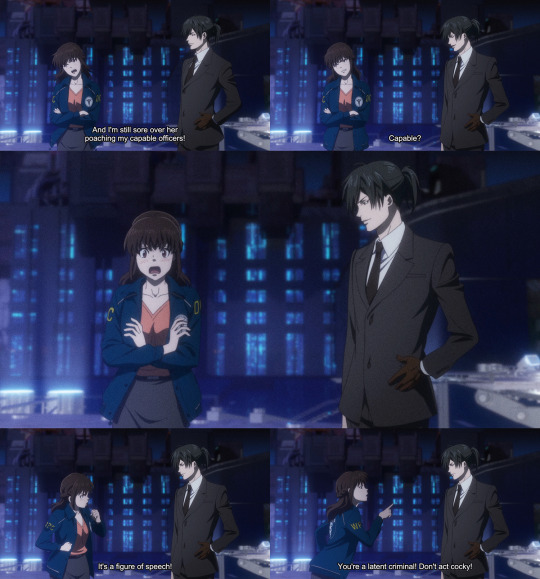
[Though she'll never admit it, Mika views Ginoza as both a mentor and a friend. When he leaves the PSB to join SAD/MOFA, she misses having him around.]
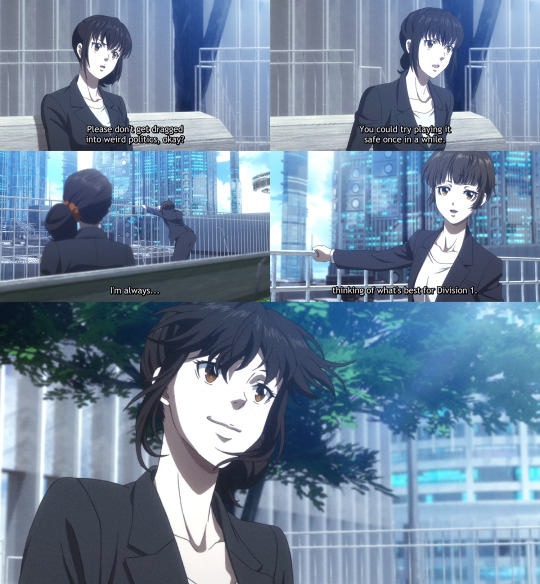
[During her lowest moment in PP2, a jealous Mika actually hopes that Akane's Hue will darken. In Sinners of the System: Case. 2, she pleads with her to take her own safety more seriously. It's clear a big change has occurred in the intervening years.]
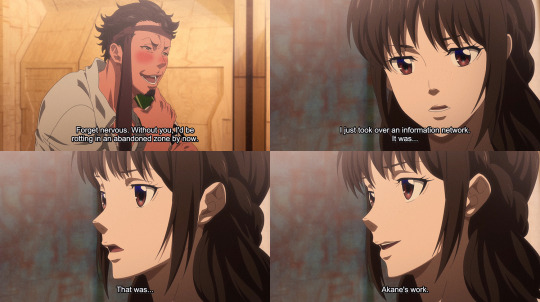
[Instead of feeling constant competition with Akane, by PP3, Mika is finally able to give her her due. It's clear they trust and respect each other despite their many differences.]
She’s grown from an immature young woman who couldn’t bring herself to take responsibility for her failures -- most notably her involvement in Akane’s grandmother’s murder -- to a responsible PSB Chief who holds herself accountable for anything that goes wrong with her Inspectors and Enforcers. This is most evident in her reaction to Koichi Azusawa taking control of Nona Tower and subsequently endangering the lives of MWPSB faculty and agents. We first see inklings of this change near the end of PP2, when Kunizuka tells Mika she’ll never forgive the person who gave up Aoi Tsunemori’s location, and Mika responds in kind. It’s clear that she’s not merely parroting a response to save her own skin but is deeply troubled and filled with regret over her own actions.

[In PP2, Mika is constantly blaming others for her mistakes. By First Inspector, she's owning mistakes she didn't even make.]

[Mika trusts her team so much, she's willing to put her job on the line.]
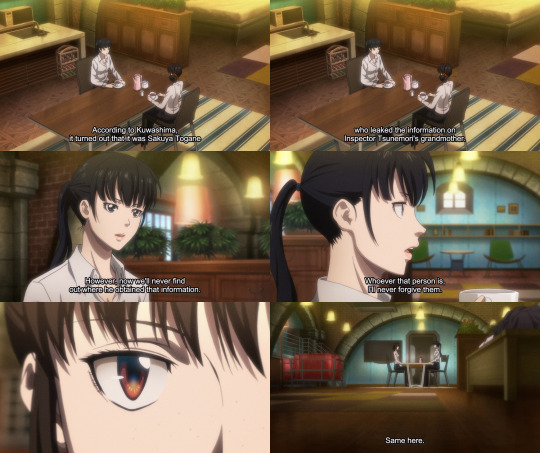
[Although Mika doesn't come clean to Kunizuka about her role in Aoi Tsunemori's death, it's clear she’s haunted by it. Later, when she confesses the truth to Ginoza, he admits to feeling a similar guilt over the way he treated his late father, telling Mika they'll have to bear their respective shame silently for the rest of their lives.]
And lastly, I believe the biggest example of Mika's growth can be found in what is arguably her most important relationship -- the one she shares with Ginoza. Whether you view them as mentor/mentee, begrudging friends, potential love interests, or all three, you can't deny that they have one of the most interesting and entertaining dynamics in the series. As mentioned above, when Mika first meets Ginoza, she views him as a cautionary tale. His demotion from Inspector to Enforcer is her worst nightmare, something that could conceivably happen to her, though she'll never admit it. Because of this, she treats him with hostility, disregarding his opinions and shunning his advice. But the longer they work together, the more we realize that Ginoza brings out the best in Mika -- and vice-versa. His calm, cool demeanor tempers her fiery spirit, and her enthusiasm makes him feel like he still has a purpose. By the time PP3 rolls around, he's become her #1 confidant, the person she calls whenever she has intel to share, grievances to air, etc. And you can't deny that Mika is the one person who makes Ginoza funny. Their flirtatious banter is genuinely charming and shows the softer, more human side of both their characters.
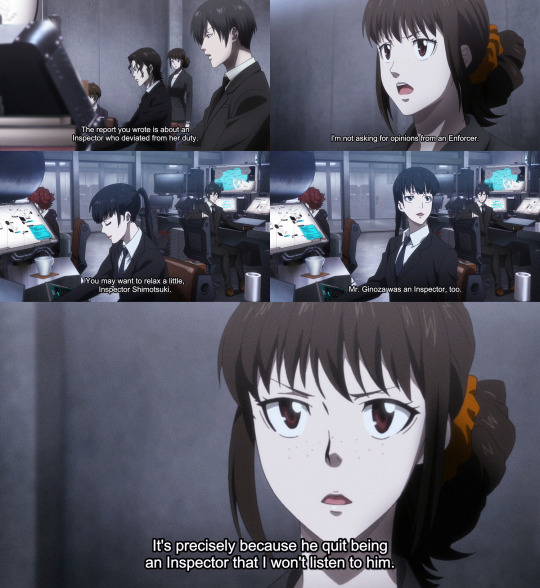
[Given her history with latent criminals, Mika refuses to listen to Ginoza, even when he's coming from a place of experience and genuinely trying to help her.]

[After working together for several years, Mika learns to value Ginoza's opinion and even feels proud when he compliments her.]

[During the Sanctuary case, Ginoza admits to both Akane and himself that being an Enforcer isn't so bad, as long as Mika is the one calling the shots. He knows she has a good heart, and working for her reminds him why he joined the MWPSB in the first place.]
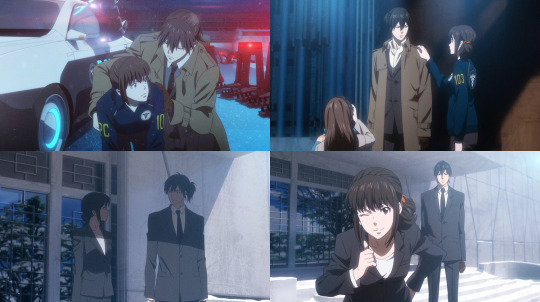
[Notice how Mika's body language changes from PP2 to Sinners of the System. She now looks at Ginoza with appreciation and, in certain instances, affection. The fact that he views her the same way speaks volumes about how far their relationship has come.]
If you made it to the end of this mammoth post, thank you for sticking with me. Hopefully, we can all treat Mika with a little more patience, kindness, and respect when PP4 arrives.
#psycho pass#psycho-pass#pp#shimotsuki mika#tsunemori akane#ginoza nobuchika#ginomika#ginoza x mika#anime#animanga#anime meta#women in anime#women in media#feminism#tsundere#my meta#text post#fandom discourse#did i really write a 4000 word essay defending an anime character?#you fucking bet i did#and i brought receipts
139 notes
·
View notes
Text
Analysing the dynamics between Fredegami & Koaka
Or Shinkane should I say in western approach 🤭
Comparing Kogami's potential preferences between Frederica Hanashiro and Akane Tsunemori requires an examination of his interactions, mutual respect, and emotional connections with each character. Here's a detailed analysis based on available information from the "Psycho-Pass" series and movies:
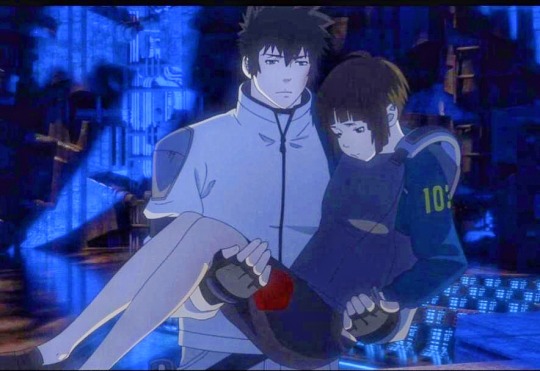
Shinya Kogami and Akane Tsunemori
Interactions:
Initial Relationship: Akane starts as a novice Inspector under Kogami, who is an Enforcer. Despite their roles, they develop a strong professional bond.
Mutual Respect: Akane admires Kogami's skills and dedication, while Kogami respects Akane's strong sense of justice and her ability to remain morally grounded despite the challenges she faces.
Trust: Throughout the series, Kogami and Akane demonstrate significant trust in each other. Akane often defends Kogami’s actions and decisions, even when they are controversial.
Emotional Connection:
Deep Understanding: Akane seems to understand Kogami's motivations and inner turmoil better than most, often acting as a moral compass and emotional anchor for him.
Sacrifice and Concern: Akane shows genuine concern for Kogami’s well-being, going as far as risking her career to protect him. Kogami, in turn, values Akane’s safety and shows concern for her well-being, often advising her to be cautious.
Dynamic:
Complementary Strengths: Akane’s idealism and moral integrity complement Kogami’s pragmatic and sometimes ruthless approach. Their differences often lead to a balanced perspective on justice and duty.
Evolving Relationship: Over time, their relationship evolves from one of mentorship to mutual respect and partnership. This evolution signifies a deepening bond that goes beyond mere professional interaction.
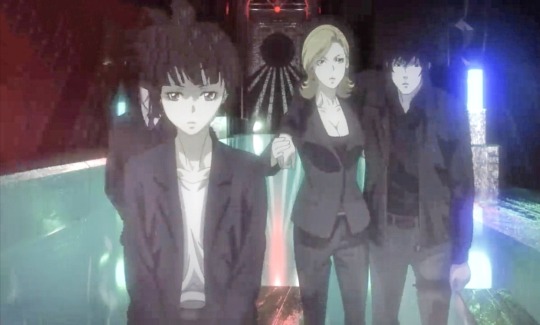
Shinya Kogami and Frederica Hanashiro
Interactions:
Professional Relationship: Frederica is introduced as a high-ranking officer with the Foreign Affairs Operations Department. Their relationship is primarily professional, with mutual respect for each other's capabilities.
Strategic Alliance: Kogami and Frederica work together on several missions, showcasing a strategic partnership. Their interactions are often mission-focused and pragmatic.
Emotional Connection:
Respect and Admiration: Frederica admires Kogami's skills and tactical acumen. Kogami, in turn, respects Frederica’s authority and strategic thinking.
Limited Personal Depth: Their interactions, while respectful and professional, lack the deep emotional connection seen between Kogami and Akane. There is a sense of professional camaraderie rather than personal intimacy.
Dynamic:
Equal Standing: Both Kogami and Frederica operate as equals, with neither being subordinate to the other. This dynamic fosters mutual respect but also limits deeper personal connections.
Focused on Mission: Their relationship is primarily defined by their shared goals and missions. There is less exploration of personal values, emotional struggles, or deeper motivations in their interactions.
Comparative Analysis
Emotional Depth:
Akane: Kogami shares a deeper emotional bond with Akane. Their relationship is marked by mutual understanding, concern, and emotional support. Akane serves as an emotional anchor for Kogami, helping him navigate his internal conflicts.
Frederica: The relationship with Frederica is more professional and pragmatic. While there is respect and admiration, it lacks the emotional depth and personal connection seen with Akane.
Mutual Respect:
Both Akane and Frederica respect Kogami for his skills and dedication. However, Akane’s respect is coupled with a deep personal concern for Kogami, while Frederica’s respect is more professional and strategic.
Complementary Dynamics:
Akane: The complementary strengths of Kogami and Akane create a balanced dynamic where they challenge and support each other’s views on justice and morality.
Frederica: The dynamic with Frederica is more about strategic partnership and mutual respect in professional settings, lacking the personal growth and emotional support present in Kogami’s relationship with Akane.
Trust and Sacrifice:
Akane: There is significant trust and willingness to sacrifice for each other between Kogami and Akane. This aspect of their relationship highlights a deeper bond and mutual reliance.
Frederica: While there is trust in professional capabilities, the personal willingness to sacrifice or go beyond professional duties is less pronounced with Frederica.
Conclusion:
Kogami’s relationship with Akane Tsunemori is marked by deep emotional connection, mutual respect, and personal growth. Akane’s understanding of Kogami’s inner struggles and her role as his emotional anchor suggest a stronger and more meaningful bond.
In contrast, Kogami’s relationship with Frederica Hanashiro is characterized by professional respect and strategic partnership, lacking the same depth of personal and emotional connection. Therefore, based on the available interactions and dynamics, Kogami is likely to have a stronger preference for Akane due to their profound emotional bond and complementary strengths.
🤭😘❤️
#psycho pass providence#psycho pass#shinya kogami x akane tsunemori#akane tsunemori#kogami shinya#koaka#shinkane#hanashiro frederica#shinya kogami x frederica hanashiro#character analysis
20 notes
·
View notes
Text
Character Analysis: Byakuya Kuchiki
Captain Byakuya Kuchiki is a fan favorite, but his bad attitude typically gets him into a lot of trouble. Over time, we learned much more about Byakuya Kuchiki and what makes him such a great character after all. Byakuya redeemed himself and became a supportive brother and her after all, making him a real standout in Bleach. But in different parts of the story, Byakuya Kuchiki also showed his worst side, such as his negative personality traits or making ill-advised decisions.
His Background and Finding Love


Byakuya comes from the prestigious Kuchiki clan, one of the four noble families in the Soul Society. As the head of the Kuchiki family, he inherited the position of captain of the 6th Division. Byakuya's early life was marked by his dedication to the principles of the Kuchiki clan, emphasizing discipline and adherence to rules.
Byakuya's controversial decision to marry a commoner seemed like a bad idea, since he could potentially tarnish the noble Kuchiki family's name with this marriage. Even though the marriage was against Soul Society law, Byakuya went through with it anyway out of true happiness. The shrine with Hisana's picture serves as a heartbreaking reminder of Byakuya's enduring love and the profound impact she had on his life.
Adoption and His Treatment of Rukia

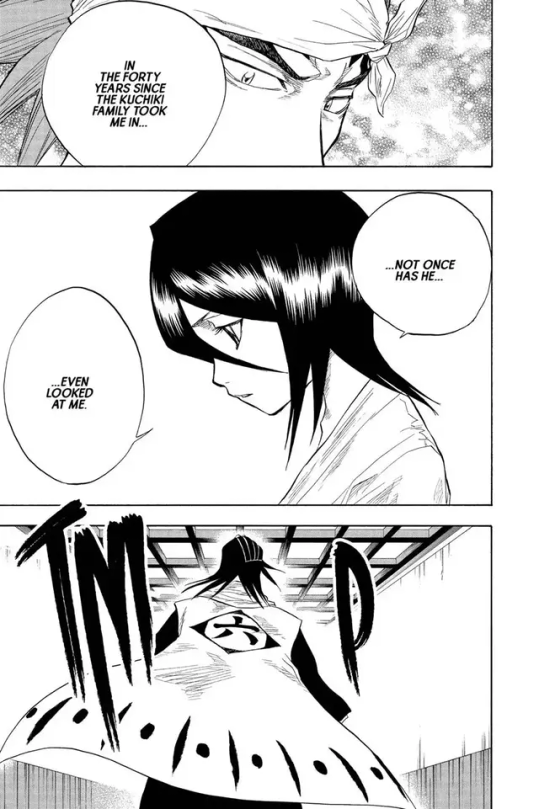
Byakuya adopted a young Rukia after the death of Hisana, fulfilling a promise he made to his dying wife. Byakuya's adherence to duty and tradition led him to adopt his sister-in-law , but the guilt of bending the rules strained their relationship.
The formal ceremony symbolized a turning point, integrating Rukia into the prestigious Kuchiki family. Byakuya's cold demeanor towards her stemmed from his duty as captain and the strict traditions of the Kuchiki clan. In an attempt to reconcile his actions with the expectations of the Kuchiki clan, Byakuya adopted a distant and cold demeanor towards Rukia. This behavior served as a coping mechanism to suppress his internal conflict, allowing him to maintain a façade of adherence to the clan's principles. His stoicism can also be seen as a form of self-punishment, as he grappled with the guilt of breaking the rules for the sake of someone he loved.
Believing that treating Rukia coldly would compensate for the unconventional adoption, Byakuya aimed to protect the honor of the Kuchiki clan and adhere to the Soul Society's rules. However, this approach inadvertently created a lonely and awkward environment for Rukia. Byakuya's misguided attempt to fulfill his duty resulted in a strained sibling relationship, depriving Rukia of the warmth and connection she may have sought in her new family.
Rukia serves as a constant reminder of Hisana for Byakuya Kuchiki. Hisana, Byakuya's late wife, pleaded with him to find and protect her younger sister before her death. By adopting Rukia, Byakuya fulfilled this promise, but the presence of Rukia became a living connection to Hisana. Every interaction with Rukia likely stirred emotions and memories associated with Hisana, intensifying Byakuya's internal conflict. The guilt of breaking the rules to save Hisana's sister and the responsibility of raising her as a Kuchiki created a complex dynamic. By treating Rukia distantly, Byakuya may have sought to suppress his emotions and maintain the façade of a stoic and duty-bound captain.
Rukia's Perspective
Rukia's perspective of Byakuya and his cold treatment, unaware of their familial connection, reflects the emotional complexity within their relationship. From Rukia's viewpoint, Byakuya appears distant and unwelcoming, making her integration into the Kuchiki family challenging. Without any knowledge of Hisana being her older sister before the reveal, she was left to interpret her older brother's behavior through the lens of his strict adherence to rules and societal norms.
Byakuya Upheld Rukia's Execution With Total Conviction

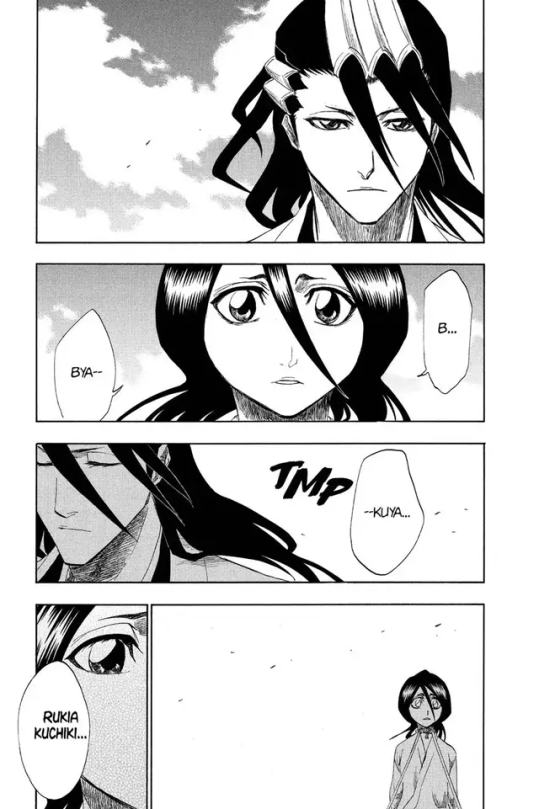
Despite his noble background, Byakuya's loyalty to the established rules took precedence over questioning the legitimacy of Rukia's sentence. His commitment to duty and the honor of the Kuchiki clan led him to defend Rukia's unfair sentence, aligning himself with the Soul Society's decisions.
Byakuya stood firmly by the Soul Society's decision to execute Rukia. His adherence to duty and the preservation of the Kuchiki clan's honor drove him to prioritize the established rules, even if it meant opposing characters like Ichigo and putting himself at odds with their efforts to save Rukia. As a member of one of the four noble families in the Soul Society, Byakuya was raised with a strict sense of duty and a strong emphasis on upholding the honor of his family and the traditions associated with it.
Saving Rukia

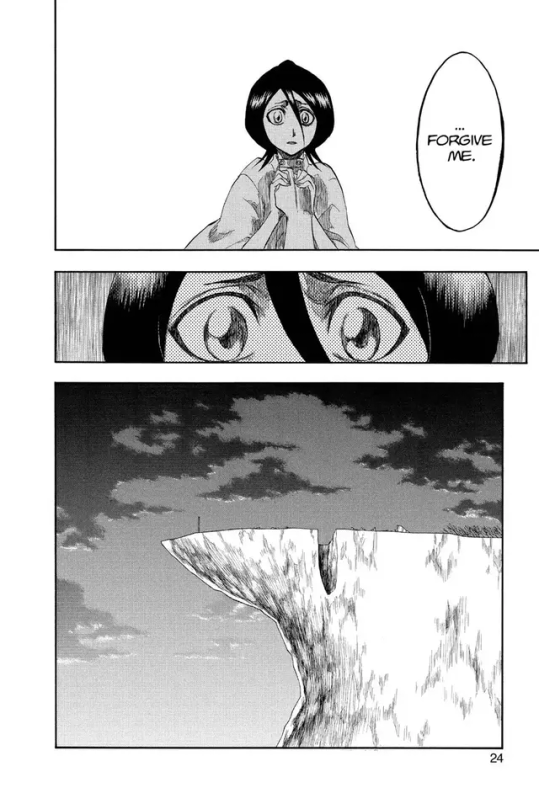
Despite his initial cold and distant attitude towards Rukia during the Soul Society arc, when faced with the threat posed by Aizen and Gin. This moment showcases a shift in Byakuya's priorities, as his actions go beyond mere adherence to rules that reflects a genuine concern for Rukia's well-being.
Hus disclosure to Rukia about Hisana's dying wish to protect her provides insight into his motivations and internal struggles. This revelation marks a turning point, humanizing Byakuya and shedding light on the complexities of his character. His sincere apology to Rukia, acknowledging the conflict between promises he made to Hisana and his parents, shows a significant step towards reconciliation and Rukia's acceptance.
#bleach#bleach rukia#rukia#rukia kuchiki#byakuya kuchiki#byakuya bleach#character writing#character analysis#male character#love#🩷#siblings#brother sister#anime thoughts#anime and manga#manga#manga analysis
40 notes
·
View notes